#+ given the constraints of the live show
Explore tagged Tumblr posts
Text
"It is 70 years since AT&T’s Bell Labs unveiled a new technology for turning sunlight into power. The phone company hoped it could replace the batteries that run equipment in out-of-the-way places. It also realised that powering devices with light alone showed how science could make the future seem wonderful; hence a press event at which sunshine kept a toy Ferris wheel spinning round and round.
Today solar power is long past the toy phase. Panels now occupy an area around half that of Wales, and this year they will provide the world with about 6% of its electricity—which is almost three times as much electrical energy as America consumed back in 1954. Yet this historic growth is only the second-most-remarkable thing about the rise of solar power. The most remarkable is that it is nowhere near over.
To call solar power’s rise exponential is not hyperbole, but a statement of fact. Installed solar capacity doubles roughly every three years, and so grows ten-fold each decade. Such sustained growth is seldom seen in anything that matters. That makes it hard for people to get their heads round what is going on. When it was a tenth of its current size ten years ago, solar power was still seen as marginal even by experts who knew how fast it had grown. The next ten-fold increase will be equivalent to multiplying the world’s entire fleet of nuclear reactors by eight in less than the time it typically takes to build just a single one of them.
Solar cells will in all likelihood be the single biggest source of electrical power on the planet by the mid 2030s. By the 2040s they may be the largest source not just of electricity but of all energy. On current trends, the all-in cost of the electricity they produce promises to be less than half as expensive as the cheapest available today. This will not stop climate change, but could slow it a lot faster. Much of the world—including Africa, where 600m people still cannot light their homes—will begin to feel energy-rich. That feeling will be a new and transformational one for humankind.
To grasp that this is not some environmentalist fever dream, consider solar economics. As the cumulative production of a manufactured good increases, costs go down. As costs go down, demand goes up. As demand goes up, production increases—and costs go down further. This cannot go on for ever; production, demand or both always become constrained. In earlier energy transitions—from wood to coal, coal to oil or oil to gas—the efficiency of extraction grew, but it was eventually offset by the cost of finding ever more fuel.
As our essay this week explains, solar power faces no such constraint. The resources needed to produce solar cells and plant them on solar farms are silicon-rich sand, sunny places and human ingenuity, all three of which are abundant. Making cells also takes energy, but solar power is fast making that abundant, too. As for demand, it is both huge and elastic—if you make electricity cheaper, people will find uses for it. The result is that, in contrast to earlier energy sources, solar power has routinely become cheaper and will continue to do so.
Other constraints do exist. Given people’s proclivity for living outside daylight hours, solar power needs to be complemented with storage and supplemented by other technologies. Heavy industry and aviation and freight have been hard to electrify. Fortunately, these problems may be solved as batteries and fuels created by electrolysis gradually become cheaper...
The aim should be for the virtuous circle of solar-power production to turn as fast as possible. That is because it offers the prize of cheaper energy. The benefits start with a boost to productivity. Anything that people use energy for today will cost less—and that includes pretty much everything. Then come the things cheap energy will make possible. People who could never afford to will start lighting their houses or driving a car. Cheap energy can purify water, and even desalinate it. It can drive the hungry machinery of artificial intelligence. It can make billions of homes and offices more bearable in summers that will, for decades to come, be getting hotter.
But it is the things that nobody has yet thought of that will be most consequential. In its radical abundance, cheaper energy will free the imagination, setting tiny Ferris wheels of the mind spinning with excitement and new possibilities.
This week marks the summer solstice in the northern hemisphere. The Sun rising to its highest point in the sky will in decades to come shine down on a world where nobody need go without the blessings of electricity and where the access to energy invigorates all those it touches."
-via The Economist, June 20, 2024
#solar#solar power#solarpunk#hopepunk#humanity#electricity#clean energy#solar age#renewables#green energy#solar energy#renewable energy#solar panels#fossil fuels#good news#hope#climate change#climate hope
1K notes
·
View notes
Text

Metriorhynchids were a group of fully marine crocodyliforms known from the mid-Jurassic to the early Cretaceous of Europe and the Americas. They were the most aquatic-adapted of all known archosaurs, with streamlined bodies, smooth scaleless skin, small front flippers, larger hind flippers, and shark-like tail flukes. They may also have been endothermic, and might even have given live birth at sea rather than laying eggs.
Rhacheosaurus gracilis here was a metriorhynchid that lived in warm shallow waters around what is now Germany during the late Jurassic, about 150 million years ago. Around 1.5m long (~5'), its long narrow snout lined with delicate pointed teeth suggests it fed on small soft-bodied prey, a niche partitioning specialization that allowed it to coexist with several other metriorhynchid species in the same habitat.
Unlike most other marine reptiles metriorhynchids didn't have particularly retracted nostrils, which may have had a limiting effect on their efficiency as sustained swimmers since higher-set nostrils make it much easier to breathe without having to lift the whole head above the surface. The lack of such an adaptation in this group may be due to their ancestors having a single nasal opening formed entirely within the premaxilla bones at the tip of the snout, uniquely limiting how far it could easily shift backwards – other marine reptiles had nostrils bound by the edges of multiple different bones, giving them much more flexibility to move the openings around.
(By the early Cretaceous a close relative of Rhacheosaurus did actually evolve nostrils bound by both the premaxilla and the maxilla, and appeared to have started more significant retraction, but unfortunately this only happened shortly before the group's extinction.)
Metriorhynchids also had well-developed salt glands in front of their eyes, but the large sinuses that accommodated these glands may have made their skulls ill-suited to deep diving, being more susceptible to serious damage from pressure changes and restricting their swimming to near-surface waters only.
Preserved skin impressions in some metriorhynchid fossils show several unusual "irregularities", including curl shapes, small bumps, and cratering. It's unknown what exactly caused these marks, but they may represent scarring from external parasites such as lampreys and barnacles.
———
NixIllustration.com | Tumblr | Patreon
References:
Andrade, Marco BD, and Mark T. Young. "High diversity of thalattosuchian crocodylians and the niche partition in the Solnhofen Sea." 56th Symposium of Vertebrate Palaeontology and Comparative Anatomy, 2008. https://svpca.org/years/2008_dublin/abstracts.pdf#page=14
Séon, Nicolas, et al. "Thermophysiologies of Jurassic marine crocodylomorphs inferred from the oxygen isotope composition of their tooth apatite." Philosophical Transactions of the Royal Society B 375.1793 (2020): 20190139. https://doi.org/10.1098/rstb.2019.0139
Spindler, Frederik. "Live Birth in a Jurassic Marine Crocodile." Abstracts of the 90th Annual Meeting of the Paläontologische Gesellschaft, 2019. https://www.palaeontologie.geowissenschaften.uni-muenchen.de/pdfs/palges2019_abstracts.pdf#page=141
Spindler, Frederik, et al. "The integument of pelagic crocodylomorphs (Thalattosuchia: Metriorhynchidae)" Palaeontologia Electronica 24.2 (2021): a25. https://doi.org/10.26879/1099
Young, Mark T., et al. "Convergent evolution and possible constraint in the posterodorsal retraction of the external nares in pelagic crocodylomorphs." Zoological Journal of the Linnean Society 189.2 (2020): 494-520. https://doi.org/10.1093/zoolinnean/zlaa021
Young, Mark T., et al. "Skull sinuses precluded extinct crocodile relatives from cetacean-style deep diving as they transitioned from land to sea." Royal Society Open Science 11.10 (2024): 241272. https://doi.org/10.1098/rsos.241272
Wikipedia contributors. “Metriorhynchidae” Wikipedia, 12 Nov. 2024, https://en.wikipedia.org/wiki/Metriorhynchidae
Wikipedia contributors. “Rhacheosaurus” Wikipedia, 02 Dec. 2024, https://en.wikipedia.org/wiki/Rhacheosaurus
#science illustration#paleontology#paleoart#palaeoblr#rhacheosaurus#metriorhynchidae#thalattosuchia#crocodyliformes#crocodylomorpha#pseudosuchia#archosaur#art#marine reptile#lamprey#barnacle#parasite
553 notes
·
View notes
Text
The difference with Sun, Moon, and Rising in signs: Libra - Pisces
Libra Sun:
A Libra Sun expresses identity through relationships, harmony, and aesthetic sensibility. These individuals see themselves as peacemakers, valuing fairness, diplomacy, and cooperation. Their ego is shaped by the quality of their connections—they often define themselves in relation to others. Libra Suns are charming and graceful, with a natural talent for seeing multiple perspectives. They’re motivated by beauty, balance, and justice, and may avoid conflict to maintain peace. While they strive for harmony, they can struggle with indecisiveness or people-pleasing tendencies.
Libra Moon:
A Libra Moon seeks emotional balance, often processing feelings through intellectual or social filters. These individuals are soothed by calm environments, pleasant company, and thoughtful conversation. They have a strong need for emotional reciprocity and may feel unsettled when relationships feel imbalanced. Emotional expression is usually tactful and controlled—they prefer to avoid drama or confrontation. There’s a desire to be liked and emotionally validated, which can sometimes lead to suppressing their own needs to keep the peace.
Libra Rising:
Libra Rising people present themselves as polite, diplomatic, and socially conscious. They have an approachable, charming demeanor and are often concerned with how they’re perceived. First impressions are marked by elegance, grace, and a sense of refinement. They approach life through the lens of relationships and often take on the role of the mediator or aesthetic curator in new environments. They may have symmetrical features, a stylish appearance, and an innate ability to attract and relate to others harmoniously.
Scorpio Sun:
A Scorpio Sun identifies with depth, intensity, and transformation. These individuals have a magnetic presence and are often emotionally powerful, even if they keep their true feelings hidden. Their ego is tied to their ability to endure, transform, and maintain control over their emotional world. Scorpio Suns are passionate, loyal, and fiercely protective—but they may also be secretive or possessive. They have a strong drive for truth and emotional authenticity and often experience life as a series of emotional rebirths and psychological breakthroughs.
Scorpio Moon:
A Scorpio Moon feels everything intensely, but rarely shows the full depth of their emotions. They crave emotional intimacy and loyalty, yet often protect themselves with emotional walls and secrecy. Trust is essential—and once given, their devotion runs deep. These individuals can be prone to emotional extremes, holding onto pain or passion long after the moment has passed. There’s a need to feel emotionally powerful and in control, and they may become withdrawn or suspicious when vulnerable. Their emotional world is private, complex, and deeply intuitive.
Scorpio Rising:
Scorpio Rising individuals come across as intense, mysterious, and perceptive. They have a penetrating gaze and an aura of quiet power that often intrigues or intimidates others. Their approach to life is strategic and instinct-driven—they observe before engaging, and prefer to stay emotionally guarded until trust is established. First impressions may be marked by a sense of secrecy, confidence, or magnetism. Others often see them as serious, private, and psychologically sharp, with an ability to see through façades and superficiality.
Sagittarius Sun:
A Sagittarius Sun identifies with freedom, exploration, and truth-seeking. These individuals see themselves as adventurers—whether physically, mentally, or spiritually. Their ego is nourished by learning, expanding horizons, and living authentically. Sagittarius Suns are optimistic, enthusiastic, and often have a bold sense of humor. They can be blunt, freedom-loving, and allergic to constraints. At their best, they inspire others with their zest for life and philosophical insight; at their worst, they may struggle with commitment or tact.
Sagittarius Moon:
A Sagittarius Moon needs emotional freedom and stimulation. These individuals process emotions through a broad, philosophical lens, often preferring optimism and logic over emotional depth. They may downplay heavy feelings and seek escape through travel, humor, or learning. Their emotional security comes from feeling unrestrained and having the space to grow. While friendly and open, they may avoid emotional intimacy if it feels too confining. They thrive in relationships that allow for adventure, intellectual connection, and shared ideals.
Sagittarius Rising:
Sagittarius Rising individuals come across as enthusiastic, energetic, and open-minded. They have an adventurous spirit that radiates outward, often attracting others with their optimism and philosophical nature. First impressions are often marked by a sense of humor, spontaneity, and an eagerness to explore life’s big questions. Their approach to life is direct, bold, and future-oriented—they’re not afraid to take risks or break from the norm. Others often see them as inspiring, curious, and refreshingly honest.
Capricorn Sun:
A Capricorn Sun defines themselves through ambition, responsibility, and long-term achievement. These individuals take life seriously and often feel a strong sense of duty to build something meaningful—whether in their career, family, or reputation. Their ego is fueled by discipline and accomplishment, and they identify with being competent, respected, and self-sufficient. Capricorn Suns can be cautious and reserved, but underneath is a deeply driven and loyal spirit. They seek success not for vanity, but for stability and legacy.
Capricorn Moon:
A Capricorn Moon feels most secure when they’re in control of their emotions and environment. They may struggle to express vulnerability and instead focus on practicality, productivity, or long-term planning as a way to cope with feelings. This Moon placement often has a serious emotional nature and may carry the weight of responsibility from a young age. Emotional needs are met through structure, trust, and achievement. Though they may appear stoic, they feel deeply and show care through consistent, tangible support.
Capricorn Rising:
Capricorn Rising individuals come across as mature, composed, and goal-oriented. Others may see them as serious, responsible, or even intimidating at first glance. Their first instinct is to plan, assess risk, and take a measured approach to life. They tend to present themselves in a professional, classic, or understated way, often giving off an air of authority. Over time, people discover their dry humor and quiet loyalty, but they lead with ambition and reliability in any new setting.
Aquarius Sun:
An Aquarius Sun expresses identity through originality, innovation, and social ideals. These individuals value independence and often identify as unconventional or ahead of their time. They’re drawn to ideas, systems, and causes that benefit the collective, and their ego is nourished by being seen as unique or visionary. Aquarius Suns are often cool-headed, intellectually curious, and a bit rebellious. While they may seem emotionally detached, they’re deeply loyal to their principles and communities, valuing connection through shared ideals over emotional intimacy.
Aquarius Moon:
An Aquarius Moon processes emotions through logic and detachment, often analyzing rather than feeling them directly. These individuals need space and independence in emotional relationships and may resist clinginess or overly emotional displays. Their inner world is driven by ideas and ideals—they feel most at ease when aligned with a larger purpose or surrounded by stimulating conversation. Emotionally, they can be unpredictable, but they care deeply in a quiet, abstract way. They feel nurtured through friendship, innovation, and mental freedom.
Aquarius Rising:
Aquarius Rising people come across as quirky, cerebral, and one-of-a-kind. They often make a striking first impression through their style, ideas, or unpredictability. Their approach to life is future-focused and experimental—they challenge norms and seek truth through innovation or rebellion. They instinctively stand apart from the crowd and may appear emotionally cool or eccentric. Others see them as interesting, unconventional, and open-minded, though sometimes hard to fully pin down.
Pisces Sun:
A Pisces Sun identifies with compassion, creativity, and spiritual sensitivity. These individuals are deeply imaginative and empathetic, often blurring the lines between self and others. They may be drawn to art, music, mysticism, or helping professions, as their ego thrives on emotional connection and transcendence. Pisces Suns often have an elusive quality and may struggle with boundaries or staying grounded. Their identity is fluid and dreamy—they see life through an emotional and symbolic lens and seek to dissolve limitations of the material world.
Pisces Moon:
A Pisces Moon feels emotions on an almost psychic level. These individuals absorb the emotional energy of others and the environment, making them incredibly compassionate—but also vulnerable to emotional overwhelm. They are nurtured by beauty, spirituality, and imagination. Dreams, intuition, and artistic outlets often serve as emotional processing tools. This Moon placement may feel misunderstood or overly sensitive and benefits from solitude and creative expression. Their emotional world is fluid, poetic, and often beyond words.
Pisces Rising:
Pisces Rising individuals appear gentle, mystical, and dreamy. They often give off a soft, ethereal energy that makes others feel safe or intrigued. Their first instinct is to flow with life rather than resist it, and they often adapt to their surroundings like water. This can make them seem elusive or hard to define. Others may see them as intuitive, imaginative, and deeply empathetic. They may unconsciously mirror those around them, blending spiritual sensitivity with an almost chameleon-like presence.
#astro notes#astrology#birth chart#astro observations#astro community#astrology observations#astrology community#astrology degrees#astro#astroblr#astrology content#astrology aspects#astrology insights#sun sign#moon sign#rising sign
339 notes
·
View notes
Text

Wake up, little girl
𓇬 kenpachi comes back to his quarters after a long day to find his girl already asleep, so he decides to wake her up, and have his way with her 𓇬
❤︎ pairing: kenpachi zaraki x f reader : reader's physical appearance isn't specified other than having hair (sry bald kings and queens)
𓇬 this filth was based off a dream i had and quickly wrote down while it was still fresh in my mind, there's no plot whatsoever but i do want to thank my subconscious and the academy for my renewed yearning for kenpachi 𓇬
warnings: 18+ smut. kids, don’t fucking read this. rough sex, crying, pet names, aftercare, safety’s off (raw). word count: 1.6k
The squad 11 barracks were still lively at a quarter to midnight, many of the squad members were still up, sparring, drinking and showing off their skills - a general rowdiness that was to be expected for a division comprised entirely of men, aside from the lieutenant of course.
Their captain, cared little for the day-to-day activities of his squad, and left them to do as they pleased, with only one rule - as long as the noise didn't travel as far as his quarters or the other squad’s barracks, he didn't give a rat's ass what they did. The members all dutifully respected the single constraint their captain had given, and were quick to check on one another if the noise levels got too loud.
When Kenpachi finally returned to the barracks he felt cranky. It’d been an especially long day of mind-numbing tasks and meetings, which were not his specialty. He was a man of action, and days like this drained him of all his patience.
He stalked through the busy barracks hall, passing by members who moved swiftly to greet him. He paid them no mind. Instead, his focus remained on the feel of your reiatsu emanating from the captain’s quarters.
Leaving the squad barracks, and stepping outside to walk the short distance away to where the captain’s accommodations sat, the resounding noise from the squad faded away and he was left in the quiet stillness of the sereitei at night.
Early spring meant that the frogs were chirping and somewhere close by, a long-eared owl was hooting, but the ambience was lost on Kenpachi as he walked up to the house and slid back the shoji to your shared room.
Peering into the dim space, he could see you asleep on the futon, sprawled out on your back, the silk sheets pushed down to your waist.
For a big man, Kenpachi was very adept at moving silently when he wanted. He slipped inside, closing the shoji behind him without a sound. Slowly approaching the edge of the futon, he sat down.
His gaze was fixed to where your robe had slipped open at the front, enough to reveal the curve of your breasts and he watched with silent amusement as they rose and fell with your quiet, even snores.
So innocent and unaware of the predator hovered over you, he thought to himself. He felt his cock twitch beneath his robes, growing hard at the very thought, and he wasted no time to satisfy it.
He stretched out at your side, propping an elbow up to rest his head in his hand. His other arm reached over and traced the hem of your robe, pulling it open further. You shifted, subtly, but didn’t wake. He then reached up to cup your face, thumb brushing over your bottom lip before trailing his hand down your chest to grope one of your breasts. Again, you moved but didn’t wake.
Growing impatient, he pinched your nipple firmly, and you gasped, startled by the sensation. Your eyes flew open, and you moved quick to sit up, until you caught a glimpse of Kenpachi, stretched out lazily at your side, sharp teeth glinting in the dim light as he smiled devilishly at you. You stilled then, halfway sat up and breathing heavy, the haziness of sleep swiftly dissipating. Kenpachi chuckled.
“Did I scare you, princess?” He taunted. His touch softened, and he began to gently palm your breast, massaging away the residual sting of being pinched.
You closed your eyes and slid back against the futon, letting out a shaky breath as you relaxed again from his touch. You could feel heat immediately stirring in your core as he kneaded at your flesh.
“Silly little girl, doesn’t even know when she’s being watched…could’ve been anyone coming in here,” he purred, his gravely voice sent chills throughout your body as his fingers moved once more to toy with your abused nipple. You let out a breathy moan, arching up into his touch, and he chuckled again.
“Gonna need you to take off your robe, princess. My cock needs tending,” he ordered, and you moved quick to kick the sheets off of you completely, before shrugging out of the offending garment.
Kenpachi tossed off his captain's haori, his shitagi and kosodo, leaving him bare from the waist up, but didn’t bother to remove anything else. Instead, pushing the waistband of his hakama down just enough to free his cock.
Your legs parted invitingly as he moved to kneel between them, your eyes fixed on the trail of dark hair that began just below his naval. Following it down all the way to his cock, which was leaking eagerly against your belly, and your pussy clenched at the sight.
He reached a hand down, fingers blindly prodding at your entrance, feeling the small amount of arousal just beginning to pool there. He tutted disapprovingly.
“You’re not wet enough for me yet, girly,” he said, palm brushing against the curls at the top of your pussy as he cupped it roughly. Your cheeks burned with a mix of embarrassment and lust at his words.
“S-sorry Kenny,” you murmured. He leaned down till his nose brushed against yours, and you felt entirely at his mercy.
“Better be, cause now I’m gonna fix that,” he whispered. Your stomach fluttered with anticipation as you watched him spit in his palm and stroke himself, before swiping the head of his wet cock up and down your entrance.
Without warning, he pistoned his hips forward, pushing all the way inside you until he bottomed out. You let out a cry, hands flying up to grip his shoulders, your thighs pressing tightly against his sides. Your pussy ached with the sudden stretch, but at this angle you could feel the head of his cock press against that spot that made you see stars and you writhed, desperately trying to relax around him.
“Mhmmm, that’s it kitten, feel it, feel me,” he purred, relishing in the feeling of your body struggling to take him. His arm cradled your head, hand fisting in your hair, and he began to move.
Right away, his thrusts were brutal, and you sobbed out with each one, feeling him scrape against that spot inside you repeatedly, forcing your pussy to loosen up and drench his cock, right down to his balls, in a matter of minutes.
Soon, a thin sheen of sweat was coating you both, the wet sounds your pussy was making were obscene and you squirmed with embarrassment at the fact, but Kenpachi was loving it, howling with depraved excitement as he ravaged you.
“That’s better…. that’s how I like this pussy, crying for me…” he praised, the hand that was tangled in your hair moved down to wrap around your throat. You moaned his name, locking your legs around his waist, pulling him in deeper with each thrust.
“Kiss me…kiss me,” you pleaded, your hands coming up to cup his face. He obliged you, leaning down to kiss you hungrily.
You tightened around him once more, as his thrusts drove you towards an orgasm, and the hand on your throat slid down your body to rub your clit. Your hands fisted in his hair and you moaned against his mouth as you tipped over the edge and came hard on his cock.
He pulled away from you just enough to look down at your blissed out form, laughing maniacally as you spasmed around him, your hands moving to clutch desperately at the mattress, rocking fervently against him. Your broken moans were music to his ears.
His savage thrusts only increased as he chased his own high now. His hand left your overstimulated clit and smacked against the meat of your hip, holding you tightly against him as he fucked into you deeper, dragging out your orgasm brutally.
His repeated thrusts against that sweet spot made your vision go white, your body going into overdrive, and you felt as if it would never stop. Until finally, he pressed deep inside you, spilling into you with a loud groan. Your legs stayed hooked around his waist, and you wrapped your arms around his neck, clinging to him as you both breathed in ragged breaths.
Your body continued to squeeze his, pulsing in the aftershocks of your intense orgasm, and you felt yourself begin to sniffle, tears welling up in your eyes. Soon enough, you were sobbing quietly against him.
“Aww baby,” Kenpachi cooed, gently snaking an arm around you. He lifted you off the mattress, moving to kneel as he did.
He sat up and pulled you into his lap, your bodies still joined. His other hand coming up to cradle the back of your head as you shook in his arms. It was a fairly common occurrence for you, crying after such an intense release.
The first time it happened it freaked him out, thinking he’d done something wrong, until you explained between sobs it was just something you did. The physical release was also an emotional one for you.
Eventually, he learned to get used to it, and knew exactly how to comfort you each time. It showed a surprisingly soft side of him, a privilege that only you got to enjoy.
He held you and whispered softly to you, pressing kisses to your temple and cheeks until your sobs subsided and you sat weak and pliant in his arms, feeling safe and content.
Only then did he pull himself out of you, laying you back against the futon. He then disappeared briefly, and when he returned, the feeling of him brushing a warm wet cloth between your legs had you humming in contentment. After cleaning you up, he finally laid down beside you and pulled you against his chest.
It was quiet in the captain's quarters, safely tucked in Kenpachi’s arms. You fell into a deep, blissful sleep.
#bleach#bleach fanfiction#kenpachi zaraki#kenpachi x reader#kenpachi smut#brother puts it down#but i think he would be great at after care#change my mind#bleach x reader#bleach imagines
194 notes
·
View notes
Text
Lorraine Baines McFly and Female Autonomy
Hello. I have spent the past month slowly losing my mind about Lorraine Baines McFly, Marty's mom in Back to the Future, so I am finally trying to articulate some of the reasons I'm so feral about her.
There's a quote from Lea Thompson, the actress who played Lorraine, that goes, "The three parts that women usually get to play are virgins, whores, and mothers, and in Back to the Future Part II, I got to play all three." While this is commentary on Hollywood and the limited roles that fictional women get forced into, I think it's also interesting to think about it in terms of how these roles are reflected onto actual women and used to limit their personhood and confine them to a very narrow range of acceptable behaviors . . . and then in turn to think about how the character interacts with these roles on a Watsonian level. They're affecting not just Lorraine the character as she was written, but Lorraine from an in-universe perspective trying to navigate life as a woman in a patriarchal world. Some of the sexism she faces is a deliberate narrative choice and some of it is a result of the writers' blind spots, but for the purpose of this essay I'm less interested in teasing out which threads are which and more in looking at it holistically.
Because the thing about Lorraine is that she's aware of what the acceptable roles and behaviors for women are, and the versions that we see of her across the various timelines alternately fight against and capitulate to these constraints. What is a woman allowed to be? How much is Lorraine willing to break from those restrictions? How much does she allow other women to break from them? Does she resent her role or embrace it? I have a lot of thoughts specifically about how the different iterations of her interact with concepts of female agency and autonomy.
(Putting this under a cut because it is. Long.)
I started thinking about this when I was talking with my partner about 50's Lorraine. She's extremely active and driven and planning to Get What She Wants (in a way that is very scary, if you are Marty) . . . but at the same time she's clearly aware that she isn't supposed to be. A Good Fifties Girl is demure and passive. Lorraine isn't--but she's still trying to toe the line. I think constantly about the scene where she shows up at Doc's garage to be like "I followed you home . . . so that I can ask you to ask me to the dance." The girl can embrace borderline stalking but she draws the line at directly asking a boy out! She's exercising a lot of agency but views doing so as rebellious and subversive--and risky.
And I also want to talk about the whole "boy crazy" thing because like . . . society (especially in the fifties) tells women that the most important thing they can possibly do is find a good man and become wives and mothers, that this will define the success or failure of their entire lives (and given how many things were unavailable to single women at the time this is in many ways true) . . . and then relentlessly mocks and punishes anyone who actually takes an interest in pursuing this instead of just sitting back passively and waiting. She is trying to do what society says will make her happy! And even her desire for a white knight is very much based in the reality of her situation! She's getting sexually harassed at school and around town and she's doing exactly what she's supposed to and standing up for herself and saying no and fighting back--and this is not enough. She does need backup! Biff harasses her in the middle of a crowded cafeteria and Marty is the ONLY person who does anything! No fucking wonder she latches onto him as hard as she does! (There's. I promise this is related but there's a BttF parody musical on YouTube where when Strickland comes to break up the lunchroom fight he says, "Now, I can excuse sexual harassment, but LIGHT SHOVING?" and like it's a haha funny joke but also?? Yeah?? That IS how it works. The way Lorraine's being treated is so overlooked and normalized that the authority figure isn't going to step up the way he will when it's a physical altercation between two guys. Screams.) I wonder if part of the reason she stuck with George in the original timeline even though they didn't have a lot in common is that "I have a boyfriend" is a boundary that some people might actually take seriously whereas "I'm not interested" is not.
But. In general 50's Lorraine is very much about grabbing as much agency as she feels she's allowed to . . . and then Twin Pines Lorraine is what happens when she regrets the result of those choices (because while we don't see it, it's pretty obvious that in the original timeline she pursued George as aggressively as she pursues Marty in the new one), and so she decides to deny, not just her own agency, but female agency as a general concept. She leans so heavily on the idea that her relationship was "meant to be" because it absolves her of any culpability in creating a life she's unhappy with. She's rewritten her own past to view herself as a passive participant in something inevitable. (Exactly the view of womanhood that she was fighting so hard against in the 50's!) And she extends this idea of female passivity to the women around her: telling Linda that she should sit back and wait and a relationship will "just happen," actively resenting Jennifer for doing something as simple as calling Marty on the phone. It's a really interesting form of internalized misogyny, perpetuating these sexist ideas as almost a misguided form of self-defense.
And then for Lone Pine Lorraine this is completely flipped! She loves Jennifer for the same reason she disliked her in Twin Pines: because she reminds Lorraine of her younger self. And like . . . this is something of an extrapolation, but while obviously her husband and kids are still very important to her, it also feels like she has interests and friends and other things going on in her life, whereas part of the isolation of Twin Pines is that her life has shrunk down to the point where she's ONLY a wife and mother with nothing else to define herself by. And it also matters that in this timeline she has a partner that supports her, not just in the big dramatic moments (although also that), but you can easily see the dance as a catalyst for George actually learning to listen to her and stand up for her about smaller things as well. George McFly feminism arc. (I'm being slightly facetious but like. George starts off kind of shitty. The spying is actively Bad and I hope Marty chewed him out for it offscreen, but also his reaction to the harassment scene being "I think there's someone else she'd rather go with," implying that he sees what Biff is doing as like. Normal flirting that he expects to work. He doesn't GET it. Unsurprising because he is. A teenage boy in the fifties. But I do believe that saving Lorraine was something of a wakeup call and after that he listened to her about things that make her uncomfortable and gave her the support that she needed. Which would also give her a lot more freedom in this timeline because she has someone with more societal power who has her back!)
And then. Hell Valley.
If Lone Pine is the version of Lorraine who has the most freedom, the most opportunities to make decisions based on what she wants instead of What Is Expected Of A Woman, Hell Valley is the opposite. The things denying her agency in Twin Pines is largely societal forces (and herself); in Hell Valley she is actively being denied autonomy by her evil husband who functions as the personification of a bunch of sexist ideas.
She's been objectified to the point that she doesn't maintain control over her own body; Biff pressures her to get cosmetic surgeries so she can continue to look attractive to him because that's the only value he sees in her. Her physical appearance is entirely tailored to his preferences.
Biff's view of Lorraine is wife-as-possession. He treats her like a prize he's won and her kids like parasites. And he is NOT subtle about this. But Lorraine is still desperately clinging to the idea that she's wife-as-family. She calls Biff "your father" to Marty when he arrives, and talks about "our children" because she wants so so badly for this to be something different than what it is. It's especially terrible because this is a timeline where she got seventeen years of being happy with George, she knows what she's missing, and she keeps trying to force this new relationship into a similar mold even though Biff is openly contemptuous of her and especially her kids. It's been twelve years and she's still trying to pretend. To call back to that Lea Thompson quote: it's obvious where Biff thinks Lorraine fits on the virgin-mother-whore axis, while Lorraine is actively trying to centralize her motherhood partially because the kids really are that important to her and partially as a defense mechanism.
(And it's also such a bleak cautionary tale about how fragile women's stability can be when they're dependent on their husbands; Lorraine was happy with George and had a fair amount of freedom, but he was the only one with an income so when he died she was suddenly forced into a truly horrific situation because she had no other means to support herself and her three young children. Especially given that the Hell Valley universe is also worse in some broader political ways that mean there were probably even fewer social supports available than in real life 1973)
And god. It kills me the way that we see her lash out, the way she's clawing for autonomy when she threatens to leave . . . and then exactly how Biff levels all his axes of control against her. It's very interesting that his first tactic is consumerist (Who will pay for all your things? Who will take care of you?) and that doesn't work even though not being able to support herself is a very real concern. It's only when he threatens her kids that she folds. And then she immediately crumples and pivots to rationalizing Biff's behavior and blaming herself for her own abuse (in a way that is both HEARTBREAKING and also? surprisingly sympathetic and realistic for an 80's movie?). It's similar to the passivity we see in Twin Pines, but here we see exactly where it comes from. She doesn't have any way out so she has to pretend. It's the only way she can keep going. She has these flashes of rage but they're immediately snuffed out by despair and denial.
There's not a lot of talk about Lorraine and what there is tends to reduce her to "well she's Marty's mom" as if she's a boring character who doesn't have a lot going on. But even though most of her role in the movies has to do with her relationships with the various men in her life, those relationships are really interesting if you actually pay attention to them! She's not just (in the 80's) a wife and mother--she's someone who has a complex relationship with marriage and motherhood and the societal expectations surrounding them. She's not just (in the 50's) a vapid boy-crazy girl--she's doing her best to go after what she wants in a world that doesn't want her to (the fact that one of the things she wants turns out to be her time-traveling son from the future is unfortunate but not something she has any way of knowing!). She's stuck in a society that doesn't want women to be people, and she knows this, and because we see her across two different time periods and three different timelines you can watch how sometimes society grinds her down until she gives in and tries not to be a person. And also how, sometimes, she fights back.
#back to the future#bttf#lorraine baines mcfly#this is what i mean when i say that lorraine has SO many interesting things going on and i do not think that most of them were on purpose#but i'm here and i have a shovel.#anyway. i would kill for her.
297 notes
·
View notes
Text
Are you getting sick of fixing your house every Goddamn weekend? The struggles of modern life getting to you, with its demands to excel in your personal and professional lives? Do you want to give in to your inner animal nature and commit violence against inanimate objects for reasons unclear even to yourself other than "me angy?"
Good news. One of the hottest new businesses of our otherwise inert economy is "rage rooms," where they fill a room with a bunch of thrift store shit and charge you fifty bucks an hour to go buck wild on it with a golf putter. Whether or not this is a good idea is a matter for the psychiatrists, but I do note one thing. When given the option, every single one of the customers goes right for the printer.
Printers are, according to the Bible, the embodiment of Satan on this Earth. That's a hundred percent true, and if you don't believe me, show me the part of the Bible that doesn't say it. While essential, fixing a printer (and they need fixing frequently!) is rage-inducing, nonsensical, and often reduces even the hardiest experts to a gibbering mess. Add to this the time constraint of any printing (always done at the last minute,) and you've got yourself a recipe for sobbing into a pile of shattered gears and spilled laser toner. So being able to turn the tables on these accursed machines, and reduce them through brute force into a fine powder of microplastics, is gratifying as fuck.
Most rage rooms have convinced themselves that they need to fill a room with other stuff. Glass vases, for instance. Or a pile of intricately-arranged pianos. Nobody wants to smash this stuff, unless they're bored while waiting their turn to smash a printer. At Switch's Smash Shouse, we provide nothing but printers. Are they in good enough shape to smash with a bat? What do you care? You're getting your inarticulate, impotent rage out by beating a piece of consumer e-waste into the next dimension. We could write "PRINTER" on a piece of toilet paper tube and you'd probably still go hog wild on it for long enough to get a hernia.
143 notes
·
View notes
Text
It appears that a CERTAIN INDIVIDUAL (said with love) has taken Merlin’s immortality into doubt… Once again I find myself burdened with writing beautiful Merlin analysis.
Merlin’s lengthy longevity is, of course, visually confirmed at the end of 5x13 when we see him alive and well in the modern day, making him approximately 1,500 years old now. This is, however, not the sole factor that implies his immortality.
Physically, Merlin has had many “near misses” with death which were likely actual deaths he and others (the audience included) dismissed due to plausible deniability. In 1x04 for example, Merlin stops breathing and his heart stops shortly after Gaius and Gwen administer the potion. Gaius does not attempt to resuscitate him, yet Merlin comes back fully cognizant anyway, with no external influence.
He is also struck directly by the Dorocha, a spirit whose touch no mortal has ever survived. Again, there is plausible deniability here due to Merlin’s powerful magic. However, the writers chose to specify that no mortal has ever survived their touch. There are other ways that the Dorocha’s death-touch could have been communicated, but it was instead made plain that there is no history of mortals specifically surviving the onslaught.
This is not the only instance where human mortality is mentioned only for Merlin to be excepted from the given conditions. Cornelius Sigan is another foe who cannot be overcome easily. However, Gaius chooses to express this in terms of mortality: “Sigan is immortal and you [Merlin] are not.” Miraculously, Merlin survives their standoff. Further, in 1x07, Merlin sees Avalon, which apparently cannot be seen by any mortal until death. Merlin says outright, “I’ve seen it and I’m still here.” In hindsight, it becomes clear that these hints are intentional foreshadowing and teasing hidden in idiomatic language. Lancelot also tells Merlin that his magic “doesn’t make [him] immortal,” which in itself means little in regards to Merlin’s mortality status, but in context brings to light further evidence of authorial intent: Merlin is the only character to be on the receiving end of such lines where his mortality is questioned or otherwise put to the test. No other character is subject to this dialogue full of double meaning.
Aside from these and similar examples, the nearest verbal confirmations we receive actually begin quite early on. In 1x08, Merlin is referred to by the name “Emrys,” which translates directly as “Immortal One,” though Merlin himself does not know it. Again, plausible deniability allows for other interpretations of this description; however, since Merlin happens to carry multiple of the defining traits of immortality (extreme longevity and improbable survival, especially after death has occurred), it is likely that this correlation lends credence to causation.
Most forgotten, and perhaps most importantly, is Balinor’s motivational speech to Merlin in the Crystal Cave. His revelation that Merlin “always will be” is of course another implication of immortality that is soon clouded by Balinor’s comparison to his own spirit’s unending life; however, this is not the key factor in understanding Merlin’s immortality. It is only one half of Balinor’s statement. The full line is: “[That] you have always been… and always will be.” This implies that not only will Merlin live infinitely into the future (as seen in the following episode), but that he has existed since the dawn of time, even prior to his human incarnation. Merlin is magic itself, which cannot be made or unmade, just as energy cannot be created or destroyed — only transferred. His human form is essentially a transference of magic from the cycles of nature to a single rigid life form.
Now, there are other questions on limits and constraints that the show does not touch on. For example, since Merlin was not formerly human and is — essentially — magic that was transformed into a human, could he be transformed back to a prior, unconscious state, returning to nature and therefore fulfilling “death” by human terms? Is he forever trapped in this human form by whatever gods confined him to it, or is his form more fluid than his consciousness? Regardless, these do not negate the fact that he is immortal by human standards.
It can be inferred that the writers had planned this from the start. They had certainly planned for Arthur to find out about Merlin’s magic in the series finale, Arthur’s death, and the sugarcoating that he will rise again when Albion’s need is greatest. The finale implies that Merlin will be reunited with Arthur again someday, even if that day is centuries away — though I do believe fandom often exaggerates his desperation. Merlin is not single-mindedly thinking of nothing but Arthur: in 5x13, he just happens to be walking by and pauses briefly (indicating that he remembers) only to lift his head and move forward with his own life. It serves primarily as a confirmation that he has found peace and is no longer tortured by it. And how could he be after over 1,000 years?
I delve more into specific examples that prove Merlin’s immortality here and here for those interested in further ✨ research ✨
79 notes
·
View notes
Note
I actually do think Sirius would hate Cho, but not because she’s a weeping girl!
Sirius was very brave to cut ties with his family and fight for what he believes in, he values loyalty, and appreciate risk-taking. He would have had an issue with Cho worrying more about her mom’s ministry job than fighting “the man” - and he would have thought she chose the wrong side by sticking to Marietta the snitch.
Sirius can be quite dismissive of people’s problems and limitations. I think as an adult he’d be more understanding of her grief (teen Sirius sounds harsher), but not very forgiving about the fact that she doesn’t want to risk security or reputation.
I completely disagree.
Firstly, hate is a very strong word to use for a grown man towards a teenage girl he’s never met. Especially given the misfortunes he’s lived though… he’s not going to survive Azkaban just to make a burn book about Cho.
Second, yes he cut ties with his family, but he didn’t go off the grid; he still lived within wizarding society, and he understood the constraints of that society (he didn’t burn it all down- he was rebelling against being a certain type of wizard not against being a wizard). And for clarity it’s Marietta who’s concerned about her mum’s Ministry job, not Cho. But even if Cho had been worried, that’s still a valid concern. There are people well into their thirties who make decisions based on job security and family survival. Even, when Harry asks why the Order can’t do more, Sirius himself says it’s because Tonks and Kingsley need to keep their jobs. Part of that is strategy, yes, but it’s also an acknowledgement that people need to eat.
“Tonks and Arthur would lose their jobs at the Ministry if they started shooting their mouths off,” said Sirius, “and it’s very important for us to have spies inside the Ministry, because you can bet Voldemort will have them.”
Cho joins the DA despite the Ministry’s smear campaign against Harry. She believes him and publicly dates him (that is a public alignment with the most controversial figure in school at the time) She goes to Madame Puddifoot’s with him while the Daily Prophet is calling him a fantasist and the Ministry is painting him as unstable. Teenagers are usually obsessed with how they’re perceived, but Cho chooses principle and affection for Hqrry over her reputation and Sirius, of all people, would’ve recognised the courage in that. Also she’s grieving for her murdered boyfriend. And given that he was murdered by Peter-and I think Sirius would have extreme sympathy for this (as she is yet another one of Peter’s victims).
Yes, Cho and Harry had misunderstandings, but they were teenagers. Harry even wants to ask Sirius’s advice about girls- and given that Sirius later acknowledges that he and James were ‘arrogant little berks’ when questioned about their behaviour and tells James (in Snape’s worst memory) that Lily thinks he’s conceited, I reckon he would give Harry solid critical advice that definitely wouldn’t be the “Bitches amirite?” Type of advice that fanon Sirius would give.
And let’s be honest; Harry wasn’t exactly the most emotionally available boyfriend at the time due to his Grief, trauma and inexperience, But by the time of the Battle of Hogwarts, Cho shows up to fight. It’s clearly water under the bridge for them both as neither really did anything wrong they were just wrong for each other.
And Sirius can be dismissive,but that’s usually toward people in his own peer group: Snape, Peter, Bertha Jorkins, Crouch Sr., etc.
Also while Sirius can be reckless with his own safety, he actually urges caution with Harry throughout GoF. He’s not some reckless adrenaline junkie trying to drag everyone into a fight. He can be calculated, sometimes even too restrained for Harry’s liking. Also he listens to orders and does stay in Grimmauld for the most part.
48 notes
·
View notes
Text
10 things - 2024/2025 edition
happy new year, everyone! 2024 has been a year of change for me in so many different ways, and i've posted very little fic this year, mostly due to writers' block and time constraints. so, instead of doing the writing round up i thought i'd list 10 things i'm grateful for in 2024 (fandom edition) and 10 things i want to do in 2025 (also, fandom edition). please feel free to make your own if you wish! consider this an open tag 🏷️
2024 - things i'm grateful for (in fandom, in no particular order)
1. my ride or die friends who deal with my self doubt and breakdowns and (being 100% real) paranoia about situations that simply don't exist - @rmd-writes @celeritas2997 , the popcorn squad and others. wouldn't be writing without your support!
2. the writers who have trusted me to beta for them - @heartstringsduet @basilsunrise @rmd-writes i think i'm forgetting some (so sorry if so). michelle, being with you through first aid was such an amazing experience, and i feel so lucky to have seen you develop as a writer!
3. the people who have read my fics and encouraged me including the wip wednesday and seven sentence sunday tags! - i literally would not be anywhere without you. you actually give me life.
4. the friendships i've made on discord with people who just wanna know me for me and share little snippets of their lives - @reyesstrand and @heartstringsduet the little squirrel photos y'all send me are soul soothers for real! @st-elle-ar and @clottedcreamfudge and @lightningboltreader and @birdclowns for the cat pics! @howtosingit for your commentary and spoiler services 💜
5. the grace given to me by @carlos-in-glasses and @actual-sleeping-beauty - you two are so kind and encouraging and tell me all about your knitting projects even when i go missing for weeks on end. thank you for being my friends <3 and i don't even think you guys know you are both my yarn obsessed friends but you ARE.
6. everyone who has trusted me enough to collab with them on projects - the legends on never the same twice, @rmd-writes @strandnreyes. i loved working with you and i hope you had a positive experience! looking forward to more collabs in 2025.
7. the document gremlins, betas and sensitivity readers i've collected this year - @rmd-writes @strandnreyes @lightningboltreader @celeritas2997 @cold-blooded-jelly-doughnut ty ty ty ty some of those fics were in danger of being lost forever but we revived them!
8. @she-walked-away for making me laugh with your hilarious posts and olympia2997 who apparently doesn't exist on tumblr but leaves the most unhinged comments of all time on my fics.
9. everyone who has translated my fics or made art or gifs this year! inspired by you and in awe of you! @donghaian @whatsintheboxmh @heartstringsduet @guardian-angle22 i know there are more i'm so sorry if i've not listed you here!!!
10. everyone in the various fandoms i'm in who have created brilliant works in 2024! i am inspired by your work more than you know <3
2025 - things i want to do (in fandom, in no particular order)
1. read more, and read more broadly. expand my horizons a bit. read things that are a touch outside my go-to zones just to test the waters. read stuff by new authors!
2. spend time co-writing because that's actually my favourite thing to do. i have some things in the pipeline with a couple of people which i hope work out!
3. finish. the. damn. fic. (eurotrip). IT'S SO FREAKING CLOSE.
4. spend more time with my 2019-2021 beloveds - alex and henry. write more rwrb fic. engage in the fandom a bit more.
5. finish the ring-in 2.0 within 1 month of the LS finale (weep).
6. take one hand off the wheel with fandom relationships - my therapist tells me i need to stop trying to control how everyone feels about me and instead let people show me the kind of friendship they're interested in maintaining. scary because i think i may lose some people along the way but OH WELL WE BALL.
7. worry less about the engagement! god! i need to stop looking so much! *shakes fist at self*
8. write a little more regularly with less word count expectations.
9. learn how to be okay with smaller comments (from myself). sometimes i feel terrible if i don't write a damn essay but sometimes it stops me from reading which is horrible!
10. be a better fandom contributor than i was in 2024 - i think continuous growth is important and i'm always open to feedback (as long as it's constructive and genuine)! my mission is to always make a positive contribution and to make people feel good about themselves, and if i can even do that for one person in 2025, i think i will achieve this goal.
ty for the 2024 wrapped tags @hippolotamus @rmd-writes @reyesstrand @emsprovisions @nancys-braids @carlos-in-glasses @lemonlyman-dotcom @alrightbuckaroo @strandnreyes @thisbuildinghasfeelings @whatsintheboxmh @heartstringsduet @firenati0n @cha-melodius. you are real ones! consider this a tag back if you would like to do a 2024/2025 10 things edition.
#10 things in 2024 and 2025#this is my version of the fic wrapped because i barely posted anything this year#911 lone star#red white and royal blue#ty everyone!
62 notes
·
View notes
Text
山本泰一郎 Yasuichiro Yamamoto storyboarded and directed episodes #927 and #928 - The Scarlet School Trip (#1000 to #1005 in the manga)
Despite the limitations and the lack in some departments such as the art direction or the color design, which have made it difficult to create a strong atmosphere for several years (it's still the case today), and despite the heavy workload, Yamamoto managed to make the two 40-minutes episodes both interesting and different from what we are used to, offering a different perspective given the constraints.
Rather than attempting to create something with a variety of different shots and opting for a contemplative atmosphere showcasing the beauty of Kyoto during the dialogues, Yamamoto used a significant amount of effects based on the manipulation of the layers in the composition of the scenes. Since there were many conversation scenes, the director ensured not to overwhelm the viewer with many static face drawings where only the mouths would move, choosing instead to replicate a more dynamic feeling to compensate for the lack of strong character acting animation. Simple, yet very effective and eye-pleasing.
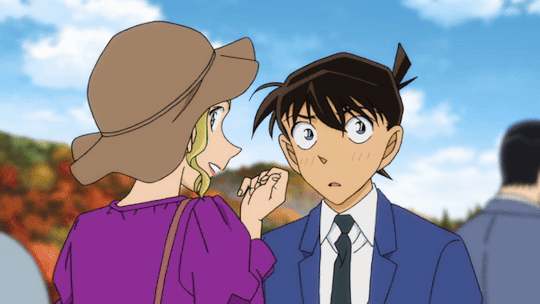
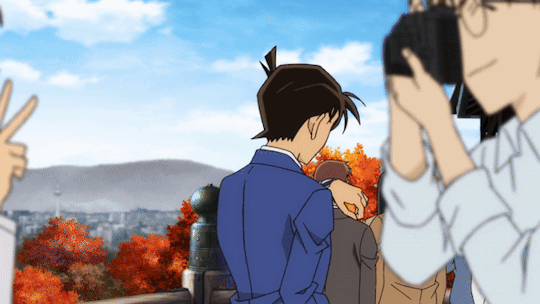
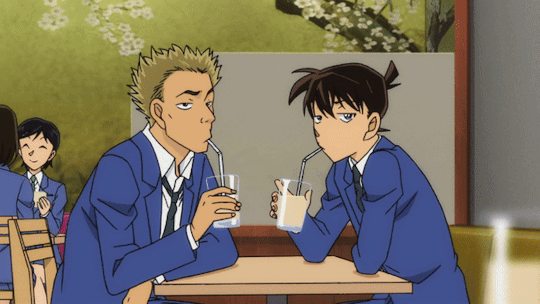
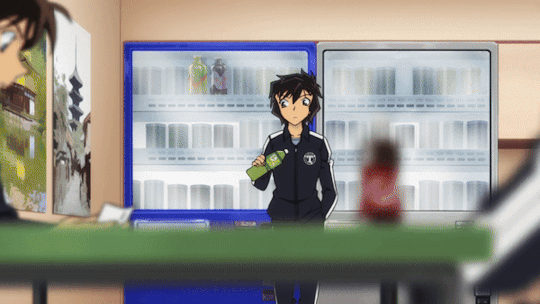
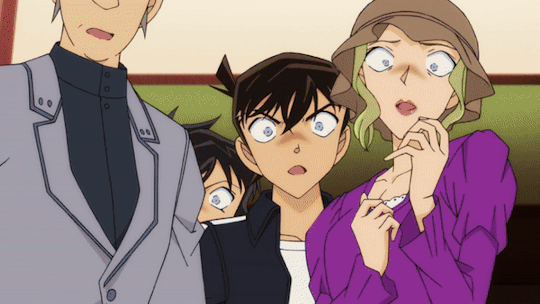
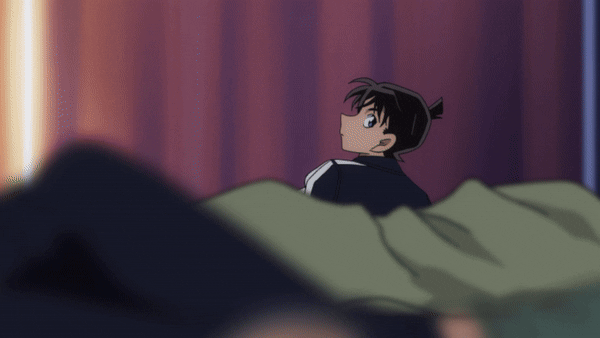
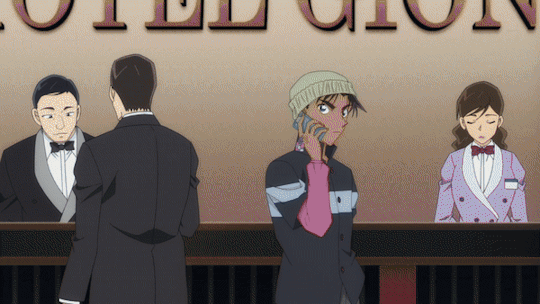
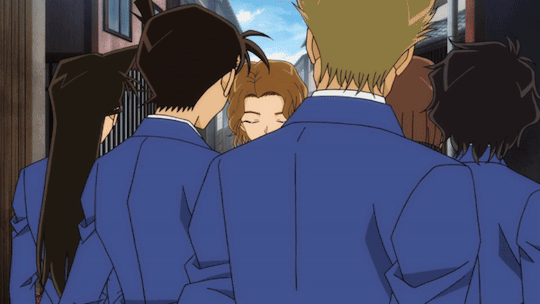
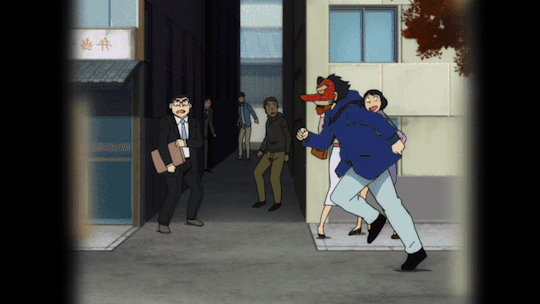
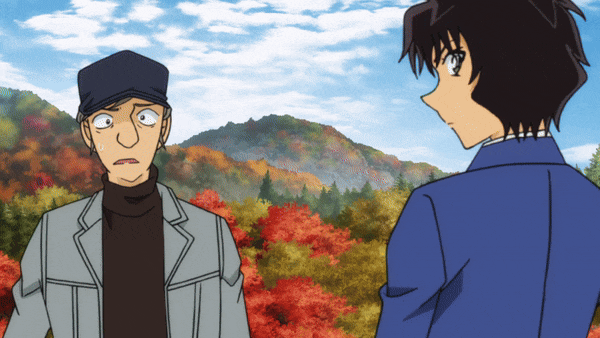
To avoid deviating too far from the main theme, which is the "school trip," many shots emphasize the feeling of constantly being surrounded and almost cramped by the Kyoto residents who live in the area, the students, the tourists, those staying at the hotel, the police later and so on. Either the main characters are in the background with people in front of them, or they are in the foreground surrounded by people behind them. With that philosophy in mind, every drawing of random people becomes important, it's even a must. There are only very few moments where Shinichi is left alone on the screen. This realistic framing also prevents Sera, for example, from interfering too much in his life while trying to get answers to her questions. Even when he is alone, there are always random people around him. Heiji, who is simply there to help his friend, is also framed that way, and the same goes for Momiji. The feeling of being cramped is present even in the smallest alleys.
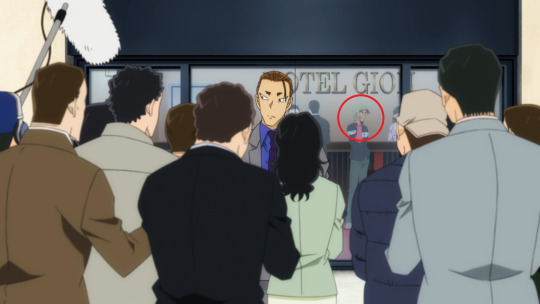
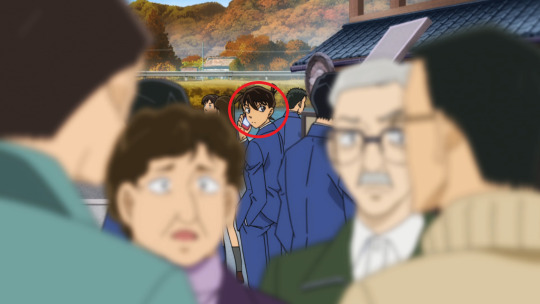
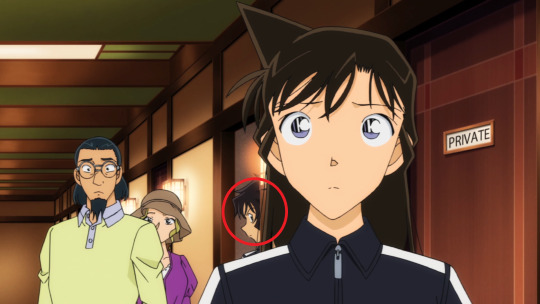
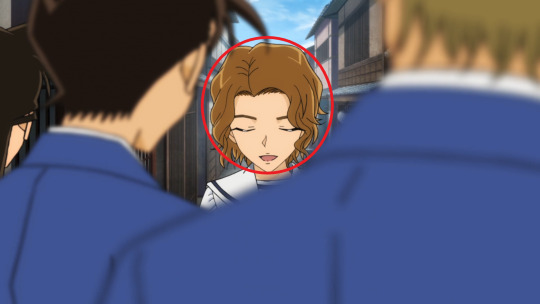
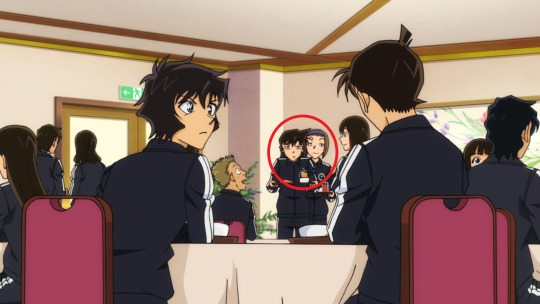
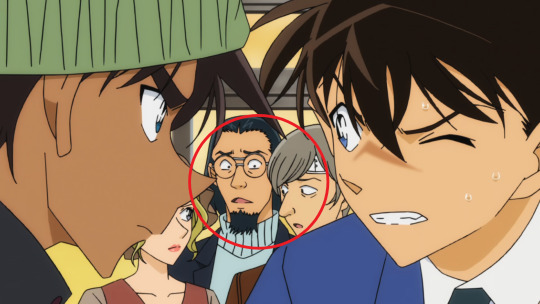
Throughout the episodes, the director doesn't hesitate to use close-up shots to establish a sense of needed intimacy between Ran and Shinichi. This is perhaps my favorite aspect of the two episodes, the focus on specific parts of the body and precise gestures to convey certain emotions, to build up the final scene. It's a way to update the characters and show their current state in a subtle manner and also a form of visual storytelling. This approach feels particularly powerful for a chapter that needed to be adapted this way. It's something that i find generally impactful when used in different medias, and something that was especially lacking in the chapters.
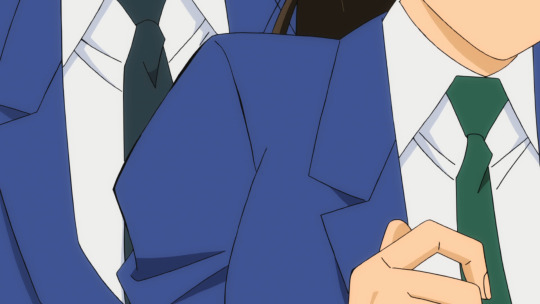
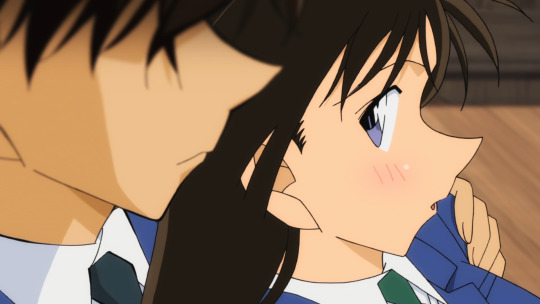
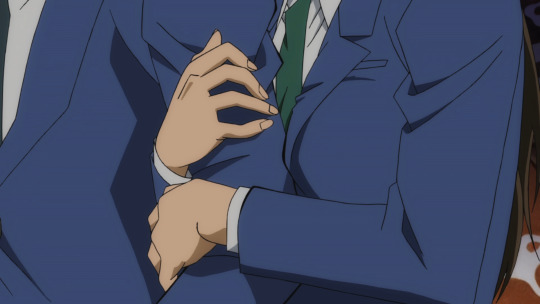
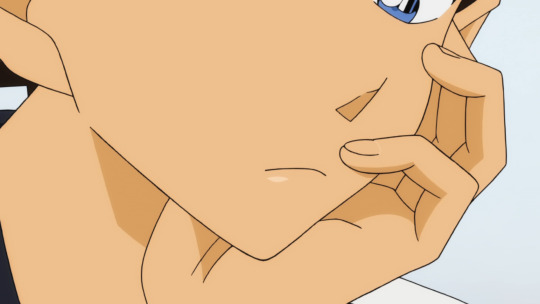
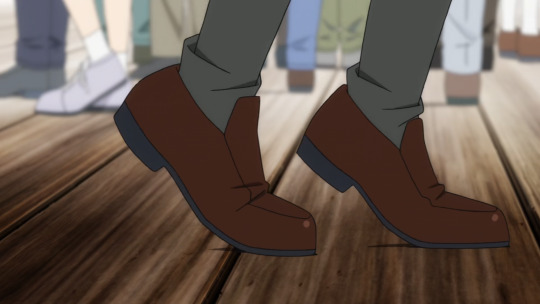
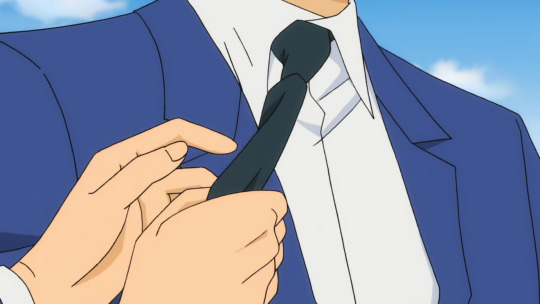
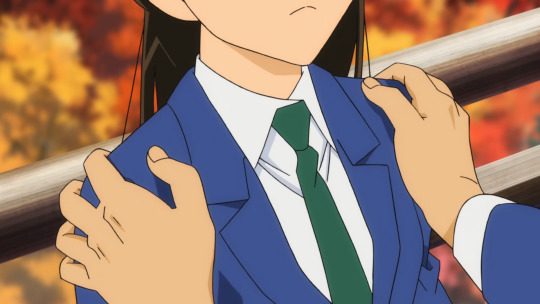
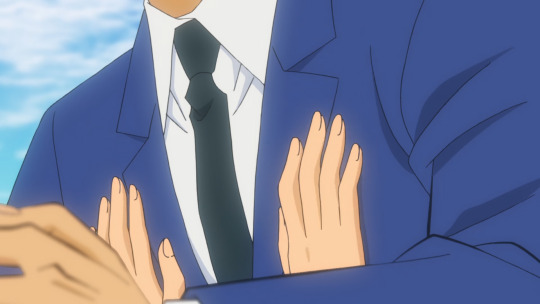
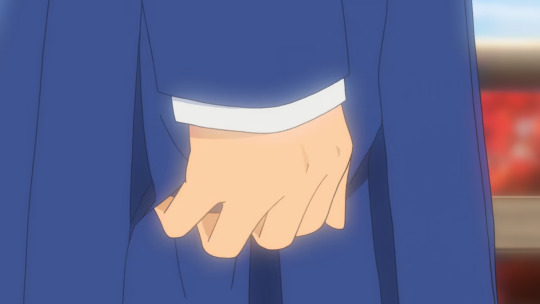
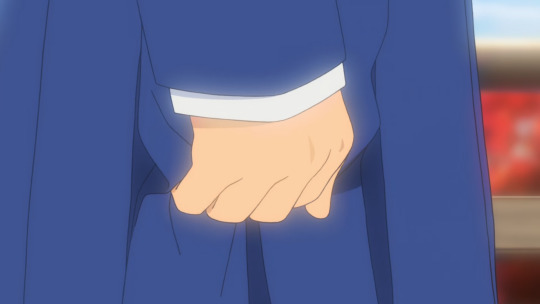
Cool color change and clean rotation.
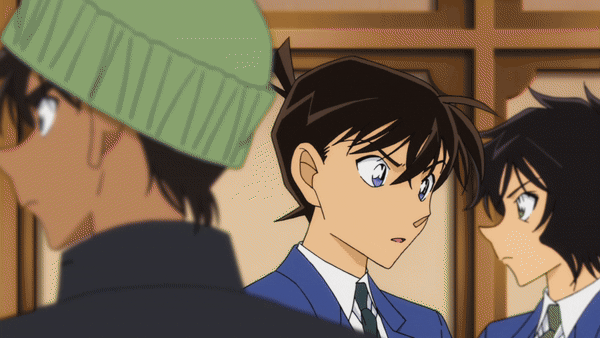
Some storyboard sketches by the director :
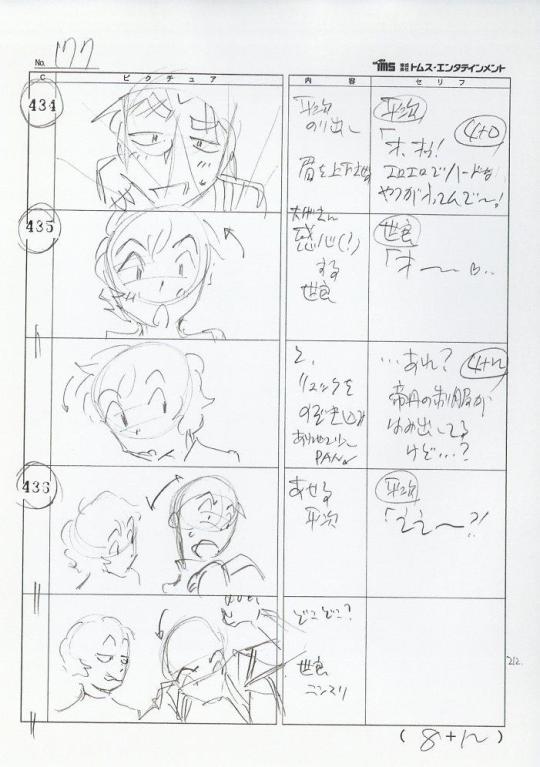

Basically, with this post, I wanted to say that the director, despite all the constraints, managed to create two very complete episodes with a clear vision. Of course, the episodes aren’t perfect, there are some janky moments and weak drawing/corrections here and there. Directing isn't just about putting beautiful shots on screen with crazy angles and things like that, it's also about knowing how to adapt and create something coherent while sacrificing certain aspects (in his case). For example, I find that the TV Special Episode One, also directed by him, much more polished than these two episodes. In any case, he deserves respect!
#名探偵コナン#detective conan#dcmk#gosho aoyama#case closed#anime#shinran#heiji hattori#kudo shinichi#storyboard#gif#yasuichiro yamamoto#ran mouri#hattori heiji
65 notes
·
View notes
Text
Cloudburst

Enshittification isn’t inevitable: under different conditions and constraints, the old, good internet could have given way to a new, good internet. Enshittification is the result of specific policy choices: encouraging monopolies; enabling high-speed, digital shell games; and blocking interoperability.
First we allowed companies to buy up their competitors. Google is the shining example here: having made one good product (search), they then fielded an essentially unbroken string of in-house flops, but it didn’t matter, because they were able to buy their way to glory: video, mobile, ad-tech, server management, docs, navigation…They’re not Willy Wonka’s idea factory, they’re Rich Uncle Pennybags, making up for their lack of invention by buying out everyone else:
https://locusmag.com/2022/03/cory-doctorow-vertically-challenged/
But this acquisition-fueled growth isn’t unique to tech. Every administration since Reagan (but not Biden! more on this later) has chipped away at antitrust enforcement, so that every sector has undergone an orgy of mergers, from athletic shoes to sea freight, eyeglasses to pro wrestling:
https://www.whitehouse.gov/cea/written-materials/2021/07/09/the-importance-of-competition-for-the-american-economy/
But tech is different, because digital is flexible in a way that analog can never be. Tech companies can “twiddle” the back-ends of their clouds to change the rules of the business from moment to moment, in a high-speed shell-game that can make it impossible to know what kind of deal you’re getting:
https://pluralistic.net/2023/02/27/knob-jockeys/#bros-be-twiddlin
To make things worse, users are banned from twiddling. The thicket of rules we call IP ensure that twiddling is only done against users, never for them. Reverse-engineering, scraping, bots — these can all be blocked with legal threats and suits and even criminal sanctions, even if they’re being done for legitimate purposes:
https://locusmag.com/2020/09/cory-doctorow-ip/
Enhittification isn’t inevitable but if we let companies buy all their competitors, if we let them twiddle us with every hour that God sends, if we make it illegal to twiddle back in self-defense, we will get twiddled to death. When a company can operate without the discipline of competition, nor of privacy law, nor of labor law, nor of fair trading law, with the US government standing by to punish any rival who alters the logic of their service, then enshittification is the utterly foreseeable outcome.
To understand how our technology gets distorted by these policy choices, consider “The Cloud.” Once, “the cloud” was just a white-board glyph, a way to show that some part of a software’s logic would touch some commodified, fungible, interchangeable appendage of the internet. Today, “The Cloud” is a flashing warning sign, the harbinger of enshittification.
When your image-editing tools live on your computer, your files are yours. But once Adobe moves your software to The Cloud, your critical, labor-intensive, unrecreatable images are purely contingent. At at time, without notice, Adobe can twiddle the back end and literally steal the colors out of your own files:
https://pluralistic.net/2022/10/28/fade-to-black/#trust-the-process
The finance sector loves The Cloud. Add “The Cloud” to a product and profits (money you get for selling something) can turn into rents (money you get for owning something). Profits can be eroded by competition, but rents are evergreen:
https://pluralistic.net/2023/07/24/rent-to-pwn/#kitt-is-a-demon
No wonder The Cloud has seeped into every corner of our lives. Remember your first iPod? Adding music to it was trivial: double click any music file to import it into iTunes, then plug in your iPod and presto, synched! Today, even sophisticated technology users struggle to “side load” files onto their mobile devices. Instead, the mobile duopoly — Apple and Google, who bought their way to mobile glory and have converged on the same rent-seeking business practices, down to the percentages they charge — want you to get your files from The Cloud, via their apps. This isn’t for technological reasons, it’s a business imperative: 30% of every transaction that involves an app gets creamed off by either Apple or Google in pure rents:
https://www.kickstarter.com/projects/doctorow/red-team-blues-another-audiobook-that-amazon-wont-sell/posts/3788112
And yet, The Cloud is undeniably useful. Having your files synch across multiple devices, including your collaborators’ devices, with built-in tools for resolving conflicting changes, is amazing. Indeed, this feat is the holy grail of networked tools, because it’s how programmers write all the software we use, including software in The Cloud.
If you want to know how good a tool can be, just look at the tools that toolsmiths use. With “source control” — the software programmers use to collaboratively write software — we get a very different vision of how The Cloud could operate. Indeed, modern source control doesn’t use The Cloud at all. Programmers’ workflow doesn’t break if they can’t access the internet, and if the company that provides their source control servers goes away, it’s simplicity itself to move onto another server provider.
This isn’t The Cloud, it’s just “the cloud” — that whiteboard glyph from the days of the old, good internet — freely interchangeable, eminently fungible, disposable and replaceable. For a tool like git, Github is just one possible synchronization point among many, all of which have a workflow whereby programmers’ computers automatically make local copies of all relevant data and periodically lob it back up to one or more servers, resolving conflicting edits through a process that is also largely automated.
There’s a name for this model: it’s called “Local First” computing, which is computing that starts from the presumption that the user and their device is the most important element of the system. Networked servers are dumb pipes and dumb storage, a nice-to-have that fails gracefully when it’s not available.
The data structures of source-code are among the most complicated formats we have; if we can do this for code, we can do it for spreadsheets, word-processing files, slide-decks, even edit-decision-lists for video and audio projects. If local-first computing can work for programmers writing code, it can work for the programs those programmers write.
Local-first computing is experiencing a renaissance. Writing for Wired, Gregory Barber traces the history of the movement, starting with the French computer scientist Marc Shapiro, who helped develop the theory of “Conflict-Free Replicated Data” — a way to synchronize data after multiple people edit it — two decades ago:
https://www.wired.com/story/the-cloud-is-a-prison-can-the-local-first-software-movement-set-us-free/
Shapiro and his co-author Nuno Preguiça envisioned CFRD as the building block of a new generation of P2P collaboration tools that weren’t exactly serverless, but which also didn’t rely on servers as the lynchpin of their operation. They published a technical paper that, while exiting, was largely drowned out by the release of GoogleDocs (based on technology built by a company that Google bought, not something Google made in-house).
Shapiro and Preguiça’s work got fresh interest with the 2019 publication of “Local-First Software: You Own Your Data, in spite of the Cloud,” a viral whitepaper-cum-manifesto from a quartet of computer scientists associated with Cambridge University and Ink and Switch, a self-described “industrial research lab”:
https://www.inkandswitch.com/local-first/static/local-first.pdf
The paper describes how its authors — Martin Kleppmann, Adam Wiggins, Peter van Hardenberg and Mark McGranaghan — prototyped and tested a bunch of simple local-first collaboration tools built on CFRD algorithms, with the goal of “network optional…seamless collaboration.” The results are impressive, if nascent. Conflicting edits were simpler to resolve than the authors anticipated, and users found URLs to be a good, intuitive way of sharing documents. The biggest hurdles are relatively minor, like managing large amounts of change-data associated with shared files.
Just as importantly, the paper makes the case for why you’d want to switch to local-first computing. The Cloud is not reliable. Companies like Evernote don’t last forever — they can disappear in an eyeblink, and take your data with them:
https://www.theverge.com/2023/7/9/23789012/evernote-layoff-us-staff-bending-spoons-note-taking-app
Google isn’t likely to disappear any time soon, but Google is a graduate of the Darth Vader MBA program (“I have altered the deal, pray I don’t alter it any further”) and notorious for shuttering its products, even beloved ones like Google Reader:
https://www.theverge.com/23778253/google-reader-death-2013-rss-social
And while the authors don’t mention it, Google is also prone to simply kicking people off all its services, costing them their phone numbers, email addresses, photos, document archives and more:
https://pluralistic.net/2022/08/22/allopathic-risk/#snitches-get-stitches
There is enormous enthusiasm among developers for local-first application design, which is only natural. After all, companies that use The Cloud go to great lengths to make it just “the cloud,” using containerization to simplify hopping from one cloud provider to another in a bid to stave off lock-in from their cloud providers and the enshittification that inevitably follows.
The nimbleness of containerization acts as a disciplining force on cloud providers when they deal with their business customers: disciplined by the threat of losing money, cloud companies are incentivized to treat those customers better. The companies we deal with as end-users know exactly how bad it gets when a tech company can impose high switching costs on you and then turn the screws until things are almost-but-not-quite so bad that you bolt for the doors. They devote fantastic effort to making sure that never happens to them — and that they can always do that to you.
Interoperability — the ability to leave one service for another — is technology’s secret weapon, the thing that ensures that users can turn The Cloud into “the cloud,” a humble whiteboard glyph that you can erase and redraw whenever it suits you. It’s the greatest hedge we have against enshittification, so small wonder that Big Tech has spent decades using interop to clobber their competitors, and lobbying to make it illegal to use interop against them:
https://locusmag.com/2019/01/cory-doctorow-disruption-for-thee-but-not-for-me/
Getting interop back is a hard slog, but it’s also our best shot at creating a new, good internet that lives up the promise of the old, good internet. In my next book, The Internet Con: How to Seize the Means of Computation (Verso Books, Sept 5), I set out a program fro disenshittifying the internet:
https://www.versobooks.com/products/3035-the-internet-con
The book is up for pre-order on Kickstarter now, along with an independent, DRM-free audiobooks (DRM-free media is the content-layer equivalent of containerized services — you can move them into or out of any app you want):
http://seizethemeansofcomputation.org
Meanwhile, Lina Khan, the FTC and the DoJ Antitrust Division are taking steps to halt the economic side of enshittification, publishing new merger guidelines that will ban the kind of anticompetitive merger that let Big Tech buy its way to glory:
https://www.theatlantic.com/ideas/archive/2023/07/biden-administration-corporate-merger-antitrust-guidelines/674779/
The internet doesn’t have to be enshittified, and it’s not too late to disenshittify it. Indeed — the same forces that enshittified the internet — monopoly mergers, a privacy and labor free-for-all, prohibitions on user-side twiddling — have enshittified everything from cars to powered wheelchairs. Not only should we fight enshittification — we must.
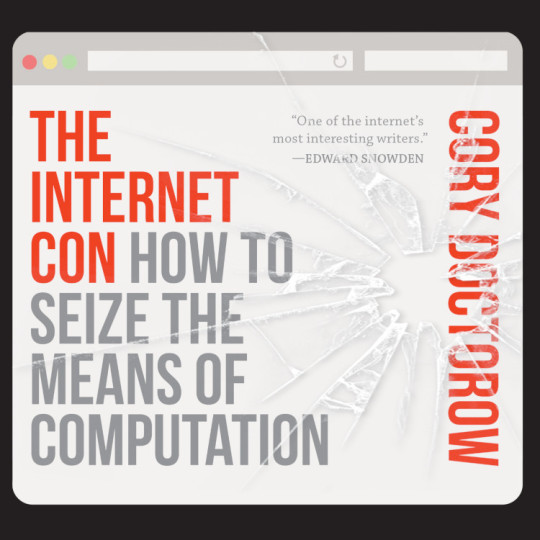
Back my anti-enshittification Kickstarter here!

If you’d like an essay-formatted version of this post to read or share, here’s a link to it on pluralistic.net, my surveillance-free, ad- free, tracker-free blog:
https://pluralistic.net/2023/08/03/there-is-no-cloud/#only-other-peoples-computers

Image: Drahtlos (modified) https://commons.wikimedia.org/wiki/File:Motherboard_Intel_386.jpg
CC BY-SA 4.0 https://creativecommons.org/licenses/by-sa/4.0/deed.en
—
cdsessums (modified) https://commons.wikimedia.org/wiki/File:Monsoon_Season_Flagstaff_AZ_clouds_storm.jpg
CC BY-SA 2.0 https://creativecommons.org/licenses/by-sa/2.0/deed.en
#pluralistic#web3#darth vader mba#conflict-free replicated data#CRDT#computer science#saas#Mark McGranaghan#Adam Wiggins#evernote#git#local-first computing#the cloud#cloud computing#enshittification#technological self-determination#Martin Kleppmann#Peter van Hardenberg
889 notes
·
View notes
Text
I think my favourite gag in PM, intentional or not, has to be the baby hard-launches. Like with Fuhui and Shouhua, the characters just suddenly saying "you're/she's pregnant, remember!" as though this is already established information when it is, in fact, not or with Kangning just ragging on her husband's ability to name their babies. It felt fitting given the 36 episode constraint where you're only getting these little snippets of the happy married lives they're living in the background of the current story and I can also respect the fact that they went no we will not show you these other 3+ babies, we gave you Jiao Jiao(I think? Netflix kept translating it to Joy, but I'm pretty sure that's what I was actually hearing) just use your imagination for the rest. I'm sure so many little kids/babies would've been hard on set for cast and crew.
It would've been cute fun to have a flashback to Fuhui and husband 2 meeting but I get why they didn't, they were very much a background couple. Overall, I had so much fun with this show, the drama of couples 3 and 1, the sweet story of 4, and the camp silliness and some sweetness from 5 (especially that cup swap scene, had me laughing. They had no faith, and rightfully so).
32 notes
·
View notes
Note
I'm probably going to sound ramble-y, apologies in advance, but Opus has rewired my brain chemistry and the limits of fanfiction and I need you to know.
I love mshenko. It's one of those ships that live in my brain rent free, and while it's canon execution has it's flaws, to see it play out on screen (the slow burn, their dynamic, the ease of it all) beyond the realm of fanon was amazing. Bioware, especially games like ME and DA2 (for example), give the illusion of character choice and development that is ultimately linear with little consequence. ME falls into this, ME2 less so, and ME3 provides maybe the most room (likely due to not planning a sequel with Shep). It's not all the time, and it's not always bad, but it's noticable if you play a lot of RPGs or wind up on your upteenth run. Sometimes the RP element falls flat, and thus the characters do, too, and you're thrown outta the loop by video game logic.
Your fic flips this entirely on its head. It's hard to explain, but the balance you've found between canon compliance and divergence is masterful. I read a scene and I'm struck by how *real* it all is, the way you've written the characters, their interactions, and how it fits into the world and the story so unobtrusively. It's the story of Mass Effect but with the characters given the first and final thought, especially Shepard, and it provides so much for exploration of what *is* canon by no longer making Shepard a vessel of player choice, but a complete character with his own goals and beliefs and development and it does *wonders* for the story of ME, everything hits so much harder because it's not "what will I do?" it's "what will Sam do?" We know him as a man and suddenly the stakes are so much higher. Maybe Opus isn't a novelization of the intricacies of the entire canon, but it's a novelization of Shepard, and of Kaidan, and I'm in awe of how you managed it.
The sheer numbers of this series astound me. The dedication, your passion, is so clear to see and so inspiring to a fellow fic writer. I too often get caught up in keeping my fics plot canon compliant that I don't realize just how much can be done in the margins of canon and still within the realm of possibility, and your work is a brilliant example of that. I applaud you, truly. To start such a project and share it with the world takes effort, drive, and you are infinitely inspirational. Opus is a masterwork, and a piece of fiction that will stick with me for a very long time. <3
Oh gosh, thank you. Mass Effect has been such a powerful experience for me because it’s impacted my life on so many levels in ways no other media has. My family, my friends, where I live, and even my day job, would not be what they are without it. So Opus, in many ways, is my attempt to put into words what it – and what Shepard – mean to me.* It’s a lot of feelings, lol.
Even though player choice often is an illusion, that illusion can be a really powerful one, and it’s part of what makes video games such a wonderful storytelling medium. You, as the player, participate in the narrative in ways you can’t with a traditional novel or a movie. Even if the story takes you to more or less the same place no matter what you do, the journey to get there feels uniquely yours. It’s exactly why I never want to see a Mass Effect movie or a TV show, because whatever linear, ‘canon’ story they decide to tell won’t look like the one that is so deeply important to me.
But that’s why fanfic is so special with games like this. It’s a multiverse where all of our experiences, all of our Shepards, all of our choices – canon compliant and canon breaking – get to co-exist. The Shepard Kaleidoscope is one of my favorite things about the Mass Effect fandom. Shepard is so many things to so many people.
Video games like this also pose some really fascinating narrative questions, because the necessary constraints that game mechanics pose on the story don’t apply in a traditional narrative. In Mass Effect, Shepard is the hero because they are the player character. Every piece of the narrative flows through them because the player is the center of the universe and the crux upon which all things turn. You don’t really think about why when you play, because the answer is self-evident – you are the player character. But a traditional written story doesn’t have that component.
So the thesis of Opus is more or less, “why Sam? Why is this guy the only person who can save the galaxy?” And Opus itself is the dissertation that makes my case. It is first and foremost a character study, so canon relationships and canon events have to be shaped and bent by him. People are messy and complicated and don't fit into binary systems like 'paragon' and 'renegade', and Sam is no exception.
It’s very important to me that Sam is the only one who can defeat the reapers not because he’s a huge badass, but because the choices he makes and the things he goes through along the way uniquely position him to do something no one else is capable of doing. I’m terribly excited about how it’s going to happen, because I will finally get the Mass Effect 3 ending I’ve wanted since March 2012 – but his ending wouldn’t work in the game because it’s designed around him.
You have no idea how incredible it is to me that Sam resonates with so many people. I really didn’t know if he would, in part because of that Shepard Kaleidoscope. We all have our own Shepards, and our own ideas of who Shepard is. Asking others to invest in a Shepard who very definitively colors outside the lines that the game drew for the character felt like a big ask. But the story I wanted to tell just wouldn’t work if I kept him to a more “default” Shepard, because that wouldn’t answer my thesis statement.
Thank you for reading it. Thank you for loving it. And thank you SO much for telling me that it means something to you. Sometimes I feel a little insane about how devoted I am to this character and his relationship with Kaidan Alenko. Having people to yell about them with is very, very special. <3
*ok, it’s also the culmination of more than a decade of spite and rage over the ending.
27 notes
·
View notes
Text
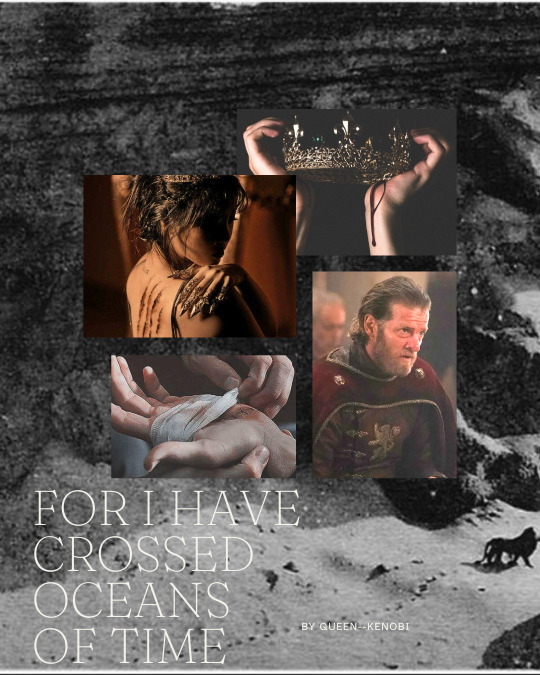
For I Have Crossed Oceans of Time: Once Upon a Time...
Summary: Castamere lays abandoned for hundred of years. Due to the age and history of its old residents, people claim it's haunted by a monster only known as Lord Reyne. At least, Tyland Lannister assumes those are the reasons for the claims. He's never been one to believe in the supernatural as he is a man of science. To prove this so-called Lord Reyne doesn't exist, he ventures to Castamere, intent on settling this once and for all. Unfortunately, science can only explain so much... A Tyland Lannister x OC (Elayna Reyne) Beauty and the Beast AU
Chapter summary: At the behest of his brother, Tyland comes back to Casterly Rock to help with a unique problem. He decides to venture forth and show the problem is merely a trick of everyone's mind and not supernatural. Work count: ~7.5k Author's note: It's finally here~ Thanks to @writingbylee for being my number one cheerleader I literally could not do this without you <3
Masterlist 🌹 Prologue
Tyland hates going “home”.
Coming back to Casterly Rock always ends with surprises, Tyland finds after almost two decades of living in King's Landing. He rarely gets a moment to himself, let alone travel all the way across the continent, but such is life as one of the King's advisors. He does his best with the constraints he has, but it is difficult to find the time to go back to the Rock.
Well, if Tyland's entirely truthful, he doesn't always try as hard as he should. It isn't as if his parents are alive and can chide him about being a better son. As for Jason, Tyland holds no doubt his brother likes it better when he's gone.
Despite him leaving all of his friends and family behind, going forth into the world at the age of 18 was remarkably easy. In his dark moments, he wonders if his parents ever truly noticed his absence or if their attention, like always, is on Jason.
Why should Tyland return again and again to a place that's served its purpose? Casterly Rock has very little left for him, especially now his nieces and nephew are getting old enough for travel. Let them come see him. He's given up more than enough for them.
This isn't to say he's bitter about it, far from it. Tyland merely approaches it from a... practical perspective.
He can't remember the last time he went back. Tyland suspects it was when Cerelle and Tymon were born, but he isn't entirely sure. He plans on going back when he and Jason reach 40, or perhaps 50. Certainly no earlier than then.
Jason's letter practically begging for Tyland's help changes his mind. Jason never asks for anything, merely takes, so for him to send a missive pleading intrigues Tyland. The details of what exactly he is to help with are vague, but Tyland gets the sense it truly is something Jason cannot handle.
Not that Jason can handle many incidents. Johanna is usually the one who ensures everything is taken care of neatly.
In his typical fashion, Jason refuses to elaborate on what exactly is the issue is, no matter how many times Tyland asks for clarification. Instead, he's told he has to come and see for himself, he won't believe it, and all sorts of drivel along those lines. He fantasize about not going and letting Jason deal with his own mess for once. Unfortunately, he loves and loathes his brother in equal measure, and so he finds himself on the road back to the Rock once more.
He can at least make the most of it while he's out there, he supposes. Tyland can make visits and give a more accurate report of how the western part of the kingdom is doing instead of merely relying on Jason's word.
He really should have expected this; Jason would want to make the request as dramatic as possible. Tyland is forced to wait until dinner to find out exactly what is wrong.
It's... disappointing.
“A beast?” Tyland arches an eyebrow. He looks to Johanna for back-up. Jason might believe in the superstitions of old, but Johanna possesses a rational mind. While she is not trained in them, she understands the natural philosophies and the way in which the world works.
Much to his surprise, Johanna looks solemn. Normally, he trusts her judgement. Her not outright denying what Jason said makes him pause for the briefest of seconds. However, a wave of disappointment washes over him. He truly thought better of her.
“It could be a creature from the mines. There is much underground we have yet to explore.” Tyland picks up his fork again and cuts into his fish.
Jason emphatically shakes his head. His face is a little pale merely speaking of the thing. Then again, a branch scraping against a window during a particularly bad thunderstorm terrifies Jason. The memory makes Tyland laugh to this day; he extends some courtesy and never laughs about it in front of others.
“You've been away. You haven't seen what my men have.”
“Oh? So you admit to not seeing it yourself?”
It's petty of him to press the issue, he knows. He has earned the right to do so, though, and will exercise it as he sees fit. Jason is only 4 minutes older than Tyland, but he makes sure Tyland understands how much power those 4 minutes give him. Even at the age of 38, Jason continues terrorizing Tyland whenever the opportunity presents itself.
Forgive Tyland if he indulges his own sadistic streak. Jason has more than earned it.
“Tymon is the one who saw it.” Johanna interjects, a little bit of irritation creeping into her voice. Jason’s face scrunches in displeasure, and he stabs viciously at his plate. Tyland bites the inside of his cheek, successfully suppressing his smirk.
Before he opens his mouth and needles Jason once more, the door at the end of the dining hall opens. All four of them turn their heads.
“Forgive my lateness.” Tymon smiles. His hair is damp, plastered to his forehead, and Tyland smells frankincense as Tymon comes close. “I did not mean to offend; I ran into a little trouble in the woods today, and I thought it wise to wash the blood off of me before I came in.”
At the mention of blood, Johanna stands up and makes her way over to Tymon. Cerelle turns her head towards him, but she stays in her seat.
“Are you alright?” She takes hold of Tymon's arms and examines them, clearly inspecting for any wounds. Tymon scrunches his face in displeasure but lets Johanna look over him. He can’t help the small indignant noise when she takes hold of his chin and turns his face. She frowns softly at a small thin line on his left cheek, but the dried blood on it is minimal.
“I’m fine, Mother!” Tyland bites in the inside of his cheek in an attempt to keep his laughter at bay. Despite Tymon’s obvious efforts, a petulant whine creeps into his voice.
“Of course he's fine. He's my son.” Jason scoffs. He reaches forward and begins loading up his plate once more with meats and breads.
“Perhaps him being your son is why I'm worried about him.” Johanna snaps back without a second thought. After a moment, she lets go of Tymon’s chin. She nods once and returns to her seat. Tymon scrunches his face when she turns her back but makes his way to his seat.
“Uncle.” He dips his head to Tyland before taking his seat next to him. Tyland responds with a nod of his own.
“Nephew.”
“What sort of trouble did you run into?” Jason looks at his son. Tymon loads his plate as a servant comes forward and fills his cup.
“My cohort and I found some tracks and followed them. I do think it may have been a lynx, but I was unable to get a good look at it. Peyton Plumm was unfortunately attacked. I do think we managed to wound the creature, although we were unable to find exactly where it hid.”
As Tymon recounts the events, Tyland frowns. Tymon speaks of his friend's injury in an unconcerned, almost callous, way, as if it was somehow the boy's fault. It bothers Tyland. For all of Jason's faults, he never speaks ill or flippantly of those he considers friends, and while Johanna is stern, sometimes to the point of harshness, she isn't uncompassionate. Hearing Tymon speak in such a manner almost chafes at him, it disturbs Tyland so much.
“Is Peyton alright?” Cerelle prompts Tymon. Tymon shrugs, the motion accentuated as he cuts into the meat.
“Bleeding some but nothing deep.”
“Good. I'm glad he is alive.” Cerelle sighs. “I would hate for you to lose another friend.”
The whole table freezes for an almost imperceptible moment. Tymon turns his head and gives Cerelle an incredibly venomous glare, Johanna presses her lips together into a thin line, and Jason nearly chokes on his wine. Cerelle, for her part, turns a vivid shade of red and casts her gaze down to her plate.
“Another?” Tyland arches an eyebrow. Normally, he doesn't care for gossip; however, his interest is piqued at the curious reaction of everyone at the table. Tymon's nostrils flare. He makes as if to stand up and storm out. A look from Johanna causes him to reconsider, slowly sinking back down into his chair.
“One of Tymon's friends went missing during a hunt.” As usual, Johanna speaks plainly and straightforward.
“My best friend.” Tymon bites out.
“They've been unable to find a body.”
Tyland winces at Johanna’s words. To lose a friend is a tragedy in and of itself, but to not have closure is another.
“He's alive. I swear to you. I know he is.” Tymon glares at everyone from his slumped position in his seat. Tyland does his best at ignoring the slight sniffle in Tymon's voice.
“Tymon. It is time to face the fa-”
“He could very well be alive.” Tyland gently interjects. Normally, he would stay out of Johanna’s way, but he cannot ignore the sheer heartbreak on Tymon's face. “Stranger things have happened. If he is skilled in the wilderness, he has q better chance for survival.”
Tymon visibly brightens. Johanna looks at Tyland and presses her lips together once more but says nothing aloud. Tyland hears her voice loud and clear from the disapproval in her eyes.
The conversation drifts to other matters. They talk for hours on many topics, some small and others large. Eventually, the small party moves into another room, where the conversation continues flowing as freely as the wine. Despite Tyland’s misgivings about his nephew, Tymon proves to be a surprisingly exceptional conversationalist. Even after Jason and Johanna retire for the night, Tyland continues speaking with Tymon and Cerelle.
“Your father seems convinced some sort of beast lurks around here.” Tyland feigns indifference by swirling his wine around in his glass.
“There is.”
Tymon and Cerelle speak as one. Thankfully, being a twin himself, the synchronicity doesn't bother Tyland, although he can understand why it may bother some. What catches his attention is the absolute certainty with which they both say it.
“Is that so?”
He watches the two of them, curious as to whether they truly believe a monster exists or if they're merely repeating what they're told.
“Well. Not here.” Cerelle presses her lips together and casts her gaze down. “It lives at Castamere.”
“Castamere?” Tyland almost laughs. “Just because a castle is a ruin does not mean it houses ghosts.”
“Oh? You haven't heard the stories then?” Tymon smiles, a slow and predator smile entirely unfit for the situation.
“I'm much too old to believe in ghost stories.” Tyland stares Tymon down, unflinching.
“It's not a ghost story, dear Uncle. It's both legend and history.” Tymon leans forward. “Surely you've heard of Iron-Heart Reyne?”
Tyland nearly huffs, both because Tymon clearly won't let the issue go and because Tymon presumes him a fool.
“Of course I have! He nearly took over the entire continent. I’ve been to Harrenhal on invitation and seen the hoof prints.”
Tymon tilts his head, his eyes lighting up with interest. Cerelle leans forward in her seat.
“So it's true? The fires he and the One-Eyed Prince set were so hot the iron shoes of their horses scorched the stones?” Tymon seems almost delighted by the information.
“Do they really go into the Sept?” Cerelle stares expectantly at Tyland.
Tyland sighs, pinching the bridge of his nose. The beginnings of a headache creep into his temples.
“No. They do not mark the stones. It's only the planks of the drawbridge.” Tyland presses his lips together. He remembers seeing them clear as day, both fear and awe combining into one. Even now, Tyland senses the sheer rage both men felt. If ever a place held onto its past, Harrenhal was it.
He can't explain why, but every night he stayed there, Tyland found himself inevitably drawn to the tracks. Rationally, he knows it's because of the history. Yet part of him feels a strange twinge in his heart, as if he knows the exact reasoning behind the rage and pain, what drove the Lord Reyne into such madness.
“They are... moving. To see a physical imprint of such an atrocity is difficult to describe. What could drive someone to do something like that is hard to understand.”
“Wasn't it love?” Tyland and Tymon turn their heads in sync and stare at Cerelle. She blushes. “I'm not defensive his actions! I merely heard a rumor.”
“While there were rumors of it, we could find no evidence of a wife existing.” Tyland keeps his voice gentle. Poor Cerelle. Her age means she still believes love can excuse all.
Tymon smirks, clearly under the impression he knows more than Tyland in this case.
“That doesn't mean he wasn't in love. It was merely the... unnatural kind.”
“There are no records corroborating such. We have no evidence he committed the sin of bedding another man. It is merely hearsay."
“It would explain why the Witch Queen of Harrenhal cursed him. He defied the natural order of things and was turned as the beast he was.” Tymon stares intensely at Tyland. Tyland nearly scrunches his face into an exasperated sneer before he catches himself. He reaches over and grabs the goblet of wine he brought with him, nearly downing it in one go.
“The supernatural does not exist. A woman named Alys existed, yes, and she did claim to be a witch. However. The only people who ever saw her perform magic were known drunkards and fools.” Tyland sighs. “Even supposing she was a witch, when would she have done that? We know Lord Reyne nearly made it to King's Landing after Harrenhal. We also know once Rhaenyra was deposed, Aegon sent Lord Reyne back to Castamere, at which point he decided to attack the Iron Islands and even managed to take several of the smaller ones. Surely, the followers of the Drowned God would report seeing an eldritch abomination attack them since it would vindicate their claims of the Greyjoys being able to do such things. So why would Alys curse a man who left her alone? Especially given only Aemond showed an interest in her. It makes no logical sense.”
“Couldn't one of the priests of the Drowned God be the one who cursed him?” Cerelle's tone is almost heart-warmingly earnest. “I've heard they were responsible.”
“The witches from Storm's End would have motive as well. Borros's eldest son was friends with Lord Reyne and was reportedly going to talk him down. They could have been attempting to show him the true monster his friend was.”
Tyland can't help himself; he laughs, a short and derogatory bark.
“Oh yes, let's just throw in witches from Storm's End now, shall we? Oh, perhaps Lord Reyne is part Direwolf! And he was to marry a Dornish princess but had a mistress from the Vale.”
Cerelle frowns, her gaze downcast for a moment. Remorse fills Tyland until he sees Tymon's expression. Tymon leans back in his chair, one forearm thrown over the back of the chair. He smirks at Tyland. The sheer gall makes Tyland bite the inside of his cheek.
“We're merely repeating the legend is all.” Tymon raises his hands in an open palm defensive position. Silent laughter dances in his eyes.
Tyland fights to keep his voice steady and calm. “I do apologize for losing my temper. However, there is no evidence to support the claims he was turned into a monster or cursed. The most logical explanation is the ‘curse’ merely started as a rumor in an attempt to defame Lord Reyne.”
Cerelle's sullen look lifts slightly. Much to Tyland’s annoyance, Tymon's smug smirk grows. He tilts his head ever so slightly, eyes glittering.
“What if I told you I, personally, have seen some of the cursed men?”
Tyland nearly laughs again. He traps it in the nick of time, clearing his throat instead. Tymon's eyes stay on him, unnerving him.
“Have you now?” Tyland’s voice, while polite and considerate, comes out strained. He brings his handkerchief up to his lips as he clears his throat again. “Do tell.”
“If you insist.” Tymon shifts in his chair, making himself comfortable in a way far too theatrical for Tyland’s taste. Tyland narrows his eyes. He wants to give Tymon the benefit of the doubt, but Tymon's demeanor bothers him. Surely, a factual recounting of events doesn't warrant such a dramatic change in posture, shifting into a more comfortable position included.
“I was out with my good friend Martyn Sarsfield and his Brax cousin one night, and we decided it might be... fun to see if we could survive an entire week at Castamere.” Tymon eases into the role of storyteller seamlessly, Jason's genes and flair for the dramatic no doubt aiding the transition. “Drinks may have been involved in this decision. Also, it may have been a bet, but that's neither here nor there. The important part is we decided we would, indeed, spend a whole week at Castamere.”
“Everything seemed fine when we began our adventure. Even when we crossed the border, things seemed fairly ordinary. Normal, even. It wasn't until we were about a day's ride away from Castamere itself things began to get strange. A storm rolled in, and we were too far away from the last inn we saw to make our way back, so we took shelter in a near-by abandoned building. None of us thought to question why the closer we got to Castamere, the more abandoned places we found. Not just homes but businesses as well.” Tymon pauses. Cerelle props her arms up on the table. Despite his better judgement, Tyland leans in a little more. He must hand it to Tymon; the boy is a natural born performer. “We set up camp in the building. I knew it was some sort of establishment, but I couldn't figure out what exactly it was used for. While Martyn worked, I began investigating, trying to figure out where exactly we were. I started on the level we were on and then went into the cellar, hoping to find something of interest. I was hoping for wine, but anything would have done. However, what I found was far more interesting.”
Tyland schools his face into a neutral expression. His eyes meet Cerelle's. She purses her lips together and lifts her cup. She uses it as a shield from Tymon, pausing and rolling her eyes once she knows he can't see her face. Tyland bites the inside of his cheek, fighting a smile.
“I found an entrance to the mines.” Tymon looks at their faces, clearly waiting for a reaction to his dramatic news.
“Mines tend to have many entrances, yes. It is almost as if their entrances can be found in caves.”
The words slip from Tyland’s mouth before he can even think to stop himself. They come out almost as a drawl. Cerelle ensures he cannot deny the sarcasm in his tone; she snickers at his words, hands flying to cover her mouth a second too late. Tymon turns an interesting shade of red, close to the color on their family crest. He puffs up his chest. Tyland holds up a hand.
“I’m sorry. Do forgive me, I have had a rather long day. I didn’t mean to interrupt your retelling.”
His platitudes work; Tymon stares at Tyland for a moment before eventually depuffing. His shoulders draw back and down, pushing his chest back as well. He dips his head in acknowledgement of the apology. Tymon clears his throat before launching once more into his tale. For the sake of keeping the peace, Tyland keeps his attention entirely on Tymon.
“I went back to my friends and told them of my discovery. Of course, they didn’t believe me, but I managed to persuade them into following me. Their curiosity was piqued. We went back and grabbed our lanterns in order to explore. We were not in the mines for long before we felt as if something, or someone, was following us. Martyn swore he could see four shadows on the walls the further we progressed, although neither me nor his cousin could ever confirm. I myself smelt the most odious stench-” Sulfur, Tyland thinks, but he keeps his mouth shut- “when we went around certain corners. It wasn’t until we stumbled upon an open area with gems. The tunnels leading up to the cave had multiple large veins of gold and silver, but we could not have imagined the amount of emeralds and rubies we found. Martyn wasted no time in trying to fill his pockets; however, he had barely started before he was attacked.”
“Attacked?” Tyland raises an eyebrow.
“Yes. Attacked. I didn’t get a good look at the attacker initially, but it was large. Larger than a man, perhaps the size of a bear. Both myself and Martyn’s cousin went to his aide. We didn’t do much damage to the thing, but we were successful in making it release Martyn. Then the thing turned on us, and...” Tymon stops. He shudders. It convinces Tyland for a moment, given it’s a full body shudder. “It was the most terrible thing I have ever seen. It looked like a man in its eyes and mouth yet the rest of its face was animalistic. The torso was shaped like a man’s but covered in thick fur. The legs were more like those of a goat. It had claws and a tail. We all screamed. I don’t remember much after, just fleeing from the monster. We got out of the mines and barricaded the entrance as best we could. If it weren’t for the claw marks on Martyn, I would have thought it a hallucination brought on by the gases in the mine.
“We decided it best to not go to Castamere itself, especially given Martyn’s state. The wounds quickly became infected, so we rushed him to the nearest doctor. The doctor claimed he had only seen such side effects from snake bites. I believe whatever it was must have a toxin of some sort on its claws. Despite not going to Castamere, we all felt a presence following us until we reached the border once more.”
Tymon stops. He looks expectantly at Tyland and Cerelle.
Tyland smiles. He almost believes Tymon due to his acting. Of course, that’s all it was: acting. Nothing of substance exists within his tale, nothing verifiable.
“As masterful of a ghost story as that was, I'm afraid none of it makes sense.”
Instantly, Tymon's gaze snaps to him, eyes blazing with fury. Tyland isn't sure if it's because he effectively called Tymon a liar or if it's because he didn't buy into Tymon's theatrics.
“Tell me, Uncle. Since when has the supernatural abided by the laws of the natural world?”
“What purpose would the tunnels serve?” Tyland counters. “If the afflicted can leave the castle willingly, why would they not use the main gate? Especially since, according to you, everything close by is abandoned? Tunnels imply a need for secrecy, which isn't necessary when no one is around to see.”
“Did I say tunnel? I misspoke. I meant to say mines.”
“The point still stands.”
Tymon's jaw twitches. For a second, it looks as if he might leap over the table and attack Tyland, standing and placing his hands upon the table. After a long and tense moment, one in which Tyland briefly considers grabbing one of the knives so he can defend himself, Tymon laughs. His golden curls spill about his shoulders as he tips his head back with the force of it.
“Oh! You should have seen your face!” Slowly, Tymon lowers himself back down into his chair. Tyland turns his head slightly towards Cerelle, but she studiously stares at her plate instead of him. “Did you really think I would attack you, dear Uncle?”
Tyland gives him an easy going smile. Quietly, he wonders what exactly went wrong with the boy, what could Jason and/or Johanna done to produce someone like Tymon.
“Your acting skills are very impressive.” The praise works; Tymon's smile becomes genuine, and he leans back further into his chair, almost lounging in it.
“I try my best.”
*****************************
He can't stop thinking about the stupid tale. Tyland knows it's merely a ghost story, no doubt an attempt to keep young children away from long disused and dangerous mines, yet it keeps him up at night. As he tosses and turns, he rotates what he learned in his head. It almost feels as if he's being called to Castamere the longer he thinks about it.
Even though it cannot possibly be the case since the supernatural firmly does not exist.
When Tyland leaves Casterly Rock a fortnight later, he tries his best to ignore the pull. He manages fairly well for the first two days. Then again, he sees many people on those days. The urge intensifies whenever he finds himself alone or undistracted. It curls inside of him, first taking root in his stomach and slowly spreading out. By the end of the third day of his travels, it almost feels as if hooks dug their way into his ribs, arms, and legs, trying their best to yank him in the direction it wants.
Tyland stops by the edge of the lake. If he follows the eastern fork, he shall be in Ashemark with plenty of time to spare. The western fork will take him towards Castamere, delaying his arrival in Ashemark by several nights. His horse snorts softly. Absent-mindedly, he reaches down and runs his hands along his mane.
The eastern edge of the lake is the correct choice. Ashemark is the more important destination of the two. He is expected in Ashemark.
He clicks his tongue softly and gently nudges his horse. His horse moves in the direction indicated, hooves occasionally clacking against one of the small river rocks dredged up from the lake. Wind rushes through the trees alongside him. It brings the smell of fresh lake water and a scent he can only describe as summer beginning to die, earthy and thick with a hint of greeny that dissipates a little more with each new gust.
A bird cries from somewhere across the lake. It sounds almost mournful. Odd, given the time of day, but Tyland won't question it. Other birds chirp and sing pleasantly in the woods to his left. A solitary bird shall not frighten him. He is a man of science and reason; omens are merely tricks of the paranoid or religious mind. For all he knows, it could be the regular cry of a raptor, or perhaps a heron, distorted by the shape of the valley and water of the lake.
The wind changes directions. Instead of blowing from the east, parallel to him and behind him, it shifts. One of Tyland’s longer, unrulier hairs flies into his face. He almost splutters. His horse lets out a louder snort. It takes Tyland a minute to push his hair out of his face, but once he does, he wraps his cloak a little bit tighter around himself.
The hooks ease some, less an agonizing pull and more a gentle tug.
It must be colder because it's coming from down the mountain. Yes. Air coming from the western side of the lake is coming down from the mountains. Everything has a logical explanation.
Curses are not real. Monsters and demons are not real either; they are animals in the forest unrecognized under the cover of darkness. Magic and the supernatural are not real. Castamere cannot be cursed, and it most certainly is not ran by a monster, a beast of a man so wretched to look upon it paralyzed Jason's men with fear.
Tyland looks up. The wind eases.
Castamere is west of the lake, and so, Tyland heads westward.
************************************************************
The weather turns ugly far earlier than he expects, dark grey rainclouds reminiscent of bruises swallowing the blue sky. It sets Tyland on edge, mostly because as the distance between him and Castamere shrinks, so does the number of people he sees. Finding an inn or any sort of decent shelter for the night almost seems like a far-fetched prospect. A few farm houses scatter the landscape, but only a handful of them look maintained, and those are the ones furthest from his destination. The last building he might could see refuge from any oncoming storm is 5 miles back and is barely standing.
It is right as the sky begins opening up and pouring its contents down Tyland finds an inn. A stroke of pure luck some might call it; Tyland prefers to think of it as percentage chance.
“Cutting it a little close, weren’t ya?” The innkeeper ribs Tyland once he comes inside. His tone isn’t exactly friendly but not mean either. Tyland stops brushing his boots on the doormat and smiles.
“I was unaware I was on the weather’s time today and not my own.” He gives a polite smile. The innkeeper snorts.
“I’ll have one of my boys put your horse up for you.”
“That would be much appreciated.”
The innkeeper calls for one of his sons. Tyland follows a young woman who guides him to a table, and it isn’t long before he’s much warmer, less hungry, and several coins lighter. The food is standard, he supposes, not necessarily anything to write home about but certainly not the worst thing he’s eaten. He objects more to the price of everything. Surely, Castamere cannot be so haunted it justifies the owners of the inn charging an arm and a leg for the services provided.
As he dines, he takes note of his surroundings out of pure habit. The Red Keep requires almost constant vigilance in case of subterfuge.
When he goes to bed later in the evening, he doesn't sleep well.
Blaming the weather and locals would be all too easy. The locals disturb him; he won't deny it. If it weren't for the fact this is the only inn around, he wouldn't spend the night here. Part of him thinks it might be better to spend the night in one of the rundown shacks, but they look more than a little uncomfortable. At least here, the bedding is deceptively comfortable.
It's also cold. Casterly Rock can be cold, and it certainly is in comparison to King's Landing, but the chill is nothing compared to the wind coming down from the mountains. He would freeze if he sleeps outside. Thankfully, the blankets he's given are not threadbare, although they aren't ones he would choose himself.
It takes him far longer than he thought to fall asleep, despite his exhaustion. Tyland stares at the ceiling. If he were prone to flights of fancy, he would say he almost would say he's waiting. For what, he does not know. Despite this, he almost feels as if he's standing on the edge of a precipice, one he didn't see until now. The tension makes it hard for his mind to relax.
Eventually, sleep claims him.
********
She faces away from him. Despite not seeing her face, instant familiarity washes over him, as well as a wave of love and fondness. He could recognize her anywhere, although he cannot remember her name at the moment. Tyland frowns.
Why can he not remember her name?
Why can he not remember his wife's name?
The thought leaves his mind as soon as it comes.
Tyland pads over to her, careful of the moss growing on the rocky outcrop. He imagines taking her hair out of the pearl net and fashionable twist, combing out her long curly brown locks carefully with his fingers and kissing her shoulders once he's done. She would smile, a soft smile reserved only for him. Her sharp edges always melt in his company.
He lowers himself and sits beside her. Both of their legs dangle over the edge. She doesn't turn her head in acknowledgement but instead leans into him, sinks into him. Her head rests on his shoulder, and he smells the rose and gardenia in her hair. Absent-mindedly, Tyland reaches around and wraps his arm around her shoulders. She reaches across his lap and grabs his hand, tangling their fingers together. He presses a kiss to the top of her head in response.
They sit in silence. They have nothing to say, no pressing matters to discuss. Those can wait. For now, only they exist.
The sun sits in the lower quarter of the sky. It sinks below the horizon slowly. As the sky turns from blue to dark blue to purples and oranges, they stay. She turns her head and nestles it into the crook of Tyland’s neck. Tyland leans his head against hers, pressing his cheek to the top of her head.
“The sun will finish setting soon.” He breaks the silence. “We should go.”
“A few more minutes.”
“If we wait, we shall walk home in the dark.” Despite Tyland’s words, he makes no effort to move. She sighs.
“I don't want this moment to end.” Sorrow fills her voice.
Tyland strokes the back of her hand with his thumb. He feels her reluctance and melancholy in his chest as well; returning back to their home means returning to the real world and their responsibilities.
“As long as we have each other, it will never end.”
“You promise? You promise you will not leave me?” Desperation fills her voice. An odd edge creeps into it, her melodic tones pitching downward. Her grip on his hand tightens.
“I promise.” Concern laces his tone. His brow furrows. “Are you alr-”
“Even if I've done terrible things? Terrible, terrible things? Unspeakable things?” They pitch down, down, down into an almost animalistic sound. Her nails dig into his skin, and he hisses; it feels as if she's drawn blood from the pain. His hand suddenly is wet and sticky.
“You're starting to scare me.” He gulps, trying his best to keep his tone even and calm. His voice wavers, both from the fear and pain coursing through him. She pushes harder into the forming wounds. Despite it being a dream, darkness dances at the edge of his vision as searing pain shoots through his arm. For the briefest and most agonizing moment, he swears he feels claws scrape lightly against the bones in his forearm.
“Do. You. Promise.”
Tyland’s head spins. He teeters on a painful precipice, clinging to consciousness as best he can.
“Yes. I promise! I promise I will not leave you.”
Her voice reaches its final, guttural pitch.
“Liar.”
***************************
A snuffling sound wakes him.
It takes a minute for Tyland’s sleep addled brain to catch up to his ears. He groans, rolling over onto his right side towards the door and placing his pillow over his head. Snoring cannot be helped, but it doesn't make it any less annoying.
He waits.
The longer he goes without hearing the noise, the more he slowly relaxes. His body eases into the mattress once more, limbs becoming heavy.
Any illusion of peace shatters instantly when he hears the unmistakable sound of the shutters rattling, not hard as if a harsh wind swept through but soft, like a robber testing a method of entry.
The sound returns, closer.
Tyland cannot bring himself to move, even if he wanted to. His body simply freezes. Every muscle tenses at the same instant. His eyes snap open. A small bit of light shines through the cracks in the shutter slats, the torch flame casting dancing shadows on the floor.
A door creaks. It doesn't come from the front of the inn but from upstairs. Tyland’s chest eases, and he gulps down a breath. Someone else hears it too. It isn't just him, someone else hears it too! His ears strain as he listens to an unknown person descending the stairs.
In the sheer silence, the front door opening is loud, filling Tyland with dread. Leaves crunch underneath someone's feet. Small pinpricks of light filter through the slats on the window, but he dares not move. Surely whomever it is left to kill whatever creature is outside.
The snarling inhale of the creature seems so close, as if it was in the same bed as him.
“Ser Lefford?” The innkeeper calls softly, hesitantly.
“No. Not Ser Lefford.”
The voice sends chills down Tyland’s spine. It's hard and sharp, conjuring up images of iridescent eyes in the deep woods. It's the slow scrape of a sword being sharpened, the hoarseness of a man choking on smoke, the growl of a lion and bear at the same time.
The planks outside of his room creaks. Tyland can't see the creature outside, but he knows from the squeal of the boards alone, it is massive.
“Lo-lo-lord Reyne!”
“Lo-lo-lord Reyne!” The presumed Lord Reyne raises its voice into a high pitched mocking voice.
“Lord Reyne, I was not exp-”
The planks groan as they release back to their normal place. A thump follows, leaves crackling. The innkeeper stops with a choking noise and splutters.
“I didn't come here for a chat.” Lord Reyne snarls, its breath no doubt hot and unpleasant. “You will speak when spoken to. You will only answer my questions. Do you understand?”
A gurgle comes in response. It satisfies the monster outside because Tyland hears a thump, the unmistakable sound of a body hitting the ground, a gasp for breath following.
He should get up. He should help him.
But what could Tyland do? If this Lord Reyne is strong enough to lift a grown man several feet in the air, based on the sound alone, who knows what exactly it is capable of? Tyland tries steadying his breathing. His pistol wouldn't be a match for it. Surely, there is another gun, but he doesn't even have the first clue of where to begin searching. Besides, even if he finds it, it might not be enough to take the creature down.
“He's... he's not one of the party.” Each word from the innkeeper's mouth sounds harsh. He's clearly straining for air.
Lord Reyne growls.
“He hasn't asked a single que-”
A yelp cuts through the night. Tyland winces. Being unable to see, he can only imagine the horror inflicted upon the innkeeper.
“Speak. When. Spoken. To.” Lord Reyne pours pure condescension into each word. “ ‘Tis simple instructions.”
Silence falls. Tyland hears a heartbeat, but he can't be certain if the terrified pound is from his heart or the innkeeper's.
“What does he know?”
“N-n-nothing.” The innkeeper’s voice comes out hoarse and strained. A low rumble carries in the distance. For a second, Tyland almost believes it came from Lord Reyne. It isn’t until he hears the wind shifting he realizes the sound must be thunder.
Yes, thunder. It must be thunder. He must...
He must be dreaming! He must be catching bits and pieces of a conversation nearby. He must be on the boundary of sleep and wakefulness, which means his sleep-addled brain is filtering what he overhears through the lenses of a dream. Tyland’s heart swells. Oh! To think this is nothing more than the remnants of a nightmare! Relief floods his entire body.
“How can you be sure?”
Tyland tries his best to even his breath. The voice almost snuffs out his hopes like a light. Lord Reyne sounds too real for him, a strange combination of both animal and man. Even under the almost supernatural edge, Tyland hears a human element to it, almost muffled in a way. It conjures memories of soldiers talking with their helmets on, voices muffled and odd sounding but still unmistakably human.
“I... I-” A cut off gasp nearly makes Tyland sit up.
“Need I remind you. I let you keep this sorry disgrace of an inn because I was told on good authority you were good at getting information.” The words grind like two millstones scraping against one another. “If you make me regret this, both you and the good authority will suffer.”
Another thump echoes. Even with the wind blowing and trees creaking, it sets Tyland’s teeth on edge. Another low rumble sounds. This time, it's unmistakably thunder. It rolls through the eerily still air, a crisp and clear warning.
“ ‘m not lyin’.”
The silence after almost feels unbearable. Eventually, he hears a low growl of discontentment.
Another peal of thunder, this one much closer, makes it so Tyland cannot hear the innkeeper. After a moment, Tyland carefully gets up out of bed and moves towards the window. Perhaps if he can get a good idea of what’s going on, he may be able to help the poor man outside.
Tyland slowly and very carefully slides the curtains back. Another roll of thunder. Tyland sees the white light for the briefest of seconds in the background. It’s not close enough to let him see much of what is going on outside.
“And no one has said anything to him?”
“No one has!”
“And I should believe you why?”
“I promise! I swear upon my children, no one will say anything to him!”
Each lighting strike comes closer and closer together, but they haven’t given him enough light. All Tyland really sees are shadows, shadows who’s proportions don’t make sense. As the lighting comes in quicker, so does the thunder. It drowns out the conversation.
In the flash of light, almost blinding white, he finally gets a good glimpse of the figure. It takes a moment for his eyes to adjust, but Tyland’s whole body goes stiff once he finally sees what exactly lurks in the dark. His mouth dries. His heart pounds wildly in his chest like a frightened rabbit.
Lord Reyne is tall, taller than any man has the right to be, than any man is. He's hunched over, but he must be at least 10 feet tall even with his head down and shoulders curled. The innkeeper, who is about as tall as Tyland, looks tiny in comparison as he hangs like a rag doll from Lord Reyne’s broad, almost paw-like, hands. The thing, for it isn’t a man, holds the innkeeper underneath his armpits so the two of them are face to face. Tyland barely sees the innkeeper because of the way Lord Reyne’s large, broad shoulders curl in and obscure almost half of the innkeeper’s torso. Fur, the color of a lion’s pelt but thick as a bear or a wolf’s coat, covers the entirety of Lord Reyne’s body from what Tyland can see, head to hands. It might even be reasonable to assume he is entirely covered in fur, especially given for the briefest of moments, Tyland swears he sees a long, sleek tail peaking out from underneath Lord Reyne’s cloth coat.
Lighting strikes. Thunder rolls. It shakes the entire inn. Tyland’s eyes hurt, and his ears ring. He should look away for fear of more pain, but he cannot tear his gaze away from the sight unfolding in front of him. The ringing in his ears means he cannot hear the conversation between the two figures in the courtyard; he tries reading their lips, but it proves more difficult than he expects. The outcome cannot be good for the innkeeper, for Lord Reyne drops him unceremoniously, as if the full grown man weighs nothing more than the smallest of house cats.
Finally, the oncoming rain arrives, coming down in a sideways large sheet. It almost instantly begins turning the dirt of the courtyard into mud. The innkeeper stumbles to his feet and runs for the door. The rain nearly makes it impossible to see if Lord Reyne still stands out in the night. The front door opens and then slams loudly shut, making Tyland turn his head. Morbid curiosity prompts him to look out towards the windows again. He cannot have seen it right, he absolutely must be thinking-
The next flash shows Lord Reyne staring directly at him, eyes glowing. They glow much like a cat’s, but it’s all wrong. Tapetum lucidem, his brain supplies, but the thought seems so far away, as if a disembodied voice said it. Lord Reyne’s eyes are vaguely shaped like a human’s but wider. His pupils look the same as a cat’s, dark slits carved into the surrounding eye color. What unnerves him most is the reflective, unblinking eyes staring back at him are hazel. Not yellow or green or whatever color most animals have but hazel, human hazel.
Tyland’s consciousness slips away from him before he can even try to get to his bed or a seat.
#persephone writes#fic: for I have crossed oceans of time#tyland lannister x oc#oc: elayna reyne#tyland lannister x ofc#hotd oc#fyeahhotdocs#house of the dragon oc
15 notes
·
View notes
Text
MY CRITICISM ISN’T JUST THAT IZZY DIED. This isn’t because he’s my favorite character. And nobody is wishing they were being handled with kid gloves. Every time I see that take, I want to scream. I can think of LOTS of ways that his death could’ve been handled better. I actually LOVE when my shows and books hurt me. I SEEK OUT media that kills characters I love. Honestly, this show was my break from that. But it’s only good when it makes sense. I’m sorry, but that was weird. Like, really weird. Nobody eulogized him? They didn’t bury him with his leg? He couldn’t think of any reason to go on living because he was just a part of Blackbeard? When Ed called for help, the crew had already written him off as dead despite the fact that this show exists in the universe it exists in and characters have literally been skewered in the same spot and been totally fine? Sacrifice Auntie and Zheng’s weird “soft”thing/reconciliation that felt unearned for the TWO MINUTES that could’ve been better spent paying respect to a major character. I would love more of Auntie and Zheng, but like… let’s be real. The opening with Ed and the fisherman? Cut that down just a smidge. I mean, it wouldn’t have been any more choppy than the rest of the episode turned out. It’s not like we’re just bitching to bitch. I can actively SEE some small ways that it could have been helped. Still wouldn’t have been enough given the constraints but it would’ve been a start.
I don’t know what’s going on on Twitter. I don’t doubt that there are bad actors that are harassing DJ and crew. But those of us screaming in our small corners of the internet are ALLOWED TO HAVE CRITICISMS. It’s almost like some of y’all need to be handled with kid gloves. So scared of hearing anything negative about your precious show. Well, it’s MY precious show, too. It’s okay to admit when things don’t live up to your expectations. It’s okay to move the goalpost, even, and try to be positive when that happens. But it almost feels deceptive to try to convince other people that their criticisms are without merit (especially when some of them are just objective. That shit was RUSHED. The pacing was BAD.)
#our flag means death#ofmd s2#ofmd s2 spoilers#izzy hands#ofmd#ofmd season 2#ofmd spoilers#ofmd finale
206 notes
·
View notes
Text
while i understand the criticisms for arcane season 2, i sincerely find myself just enjoying the show for what it is. a surprisingly good adaptation and rehashing of league of legends character lore.
the first season did some accidental agitprop and set the scene for some grounded and complex world building that feels like it adheres so much to our lived experience that it became easy to forget that I'm watching the backstory for a league of legends character and not a poignant critique on class.
but there is an arc they have to adhere to from a league of legends standpoint and one could absolutely argue that hurt the writing in the end. i'd even be inclined to agree with you to a point. piltover/zaun just make a solid entry point into a show with this level of production because it requires the least amount of time spent trying to lore dump and world build, i imagine. that being said, despite the way it's adherence to league lore harmed some of the political undertones of the show, it really does not take away from my enjoyment of the show, i don't know. it introduced me to some characters I've come to really enjoy, a world i find really intriguing and a long history of lore i think is worth exploring.
is arcane the most incredible piece of written work ever? no. we don't have to play pretend and say it's amazing in that respect, but i can say that it did something really neat with the constraints given. there was an end point each of these characters and this region had to reach because it's league of legends. ofc that's going to disappoint some.
but for me i can honestly say that somehow arcane has made me a tangential league of legends enjoyer as i open maps of runeterra and watch videos about lore and read the wiki about other characters. there's fun and whimsy here I've found.
#i don't know i just find the constant pessimism about the show a little draining#i get it#but also the show is what it is and i enjoy it#arcane#arcane season 2#league of legends#thinky
20 notes
·
View notes